THE ELEPHANT

ACADEMIC GROWTH | PERSONAL GROWTH | EMPOWER | THRIVE


ACADEMIC GROWTH | PERSONAL GROWTH | EMPOWER | THRIVE
TOORAK COLLEGE
Old Mornington Road, Mount Eliza, VIC, 3930 PO Box 150, Mount Eliza, VIC, 3930
Senior School: (03) 9788 7200
Wardle House: (03) 9788 7258
CRICOS Provider Code: 00349D
CRICOS Course Code: 005454G (Senior)
097816B (Primary)
DESIGN
Domenic Minieri
Community Office
EDITORIAL TEAM
Emma Castles and Domenic Minieri
Community Office
EDITORIAL CONTRIBUTORS
Staff, students and Collegians
PHOTOGRAPHY
Community Office, Cliff Elliott, Michael Moynihan, Marcus Struzina, staff and students
Southern Impact southernimpact.com.au
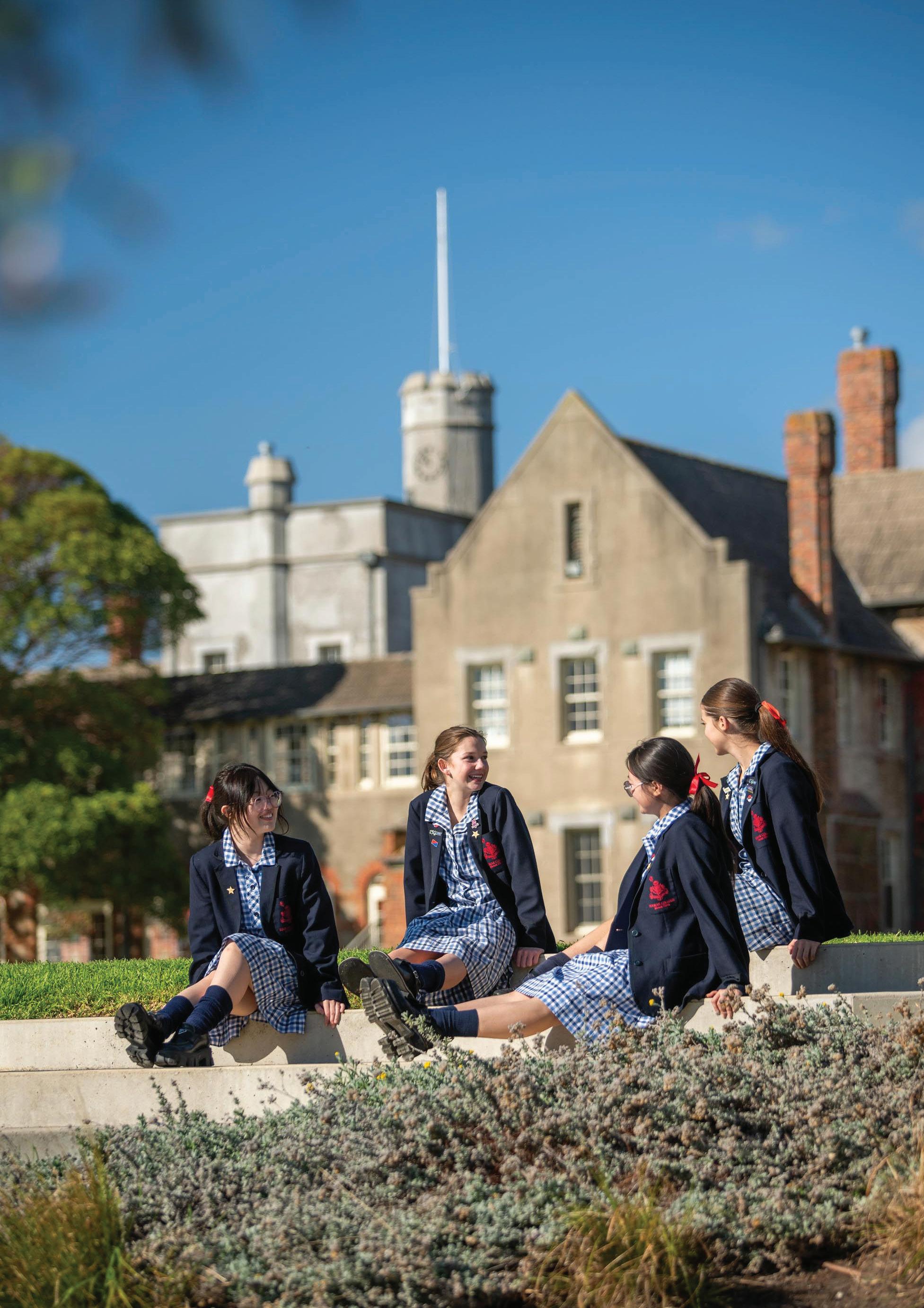

THE FUTURE IS CHANGING FAST, BUT THE WAY WE PREPARE OUR CHILDREN DOESN’T HAVE TO. IT STILL COMES DOWN TO SKILLS THAT ARE UNIQUELY HUMAN.
BY KRISTY KENDALL Principal
We have been hearing for a whole generation that today’s students are likely to be employed in jobs that have not yet been created. Sam Altman, CEO of Open AI, predicted earlier this year that we are now only five years away from computers being more intelligent than humans. This means that our current students will be the last generation to know what it is to be smarter than artificial intelligence. So how do we continue to prepare our children for this future? Although the landscape is different, the answer remains the same: skills.
It is skills such as creativity, resilience, persistence and empathy that will continue to allow an individual to thrive, no matter the situation, era, context, challenge or problem. These skills are the key to navigating the world we live in.
So, what are the three most valuable skills we can identify today that will be necessary tomorrow, and how can parents help to instil these in their children?
There is no doubt that the word ‘pivot’ is overused. But pivoting is exactly what we are going to continue to do. Being open to new ideas and ways of doing things is key to working with new teams, new technologies, and new opportunities. We must understand that changing course does not mean our past course is a failure, but is instead what led us here. To be truly adaptable takes resilience. It means forging new frontiers and trying things that are untested.
When you talk to your child, make sure you share examples of how you have changed course too. Set expectations that are based on trying new things, not achieving set milestones.
Understanding the world we live in will require all of us to have foundational knowledge of how technology works, interacts, and learns. When we start communicating, we learn words or names for things. This evolves into implied meaning, nuance, and even language that is expressed through what is not said. Understanding technology at its foundation and then learning more about its complexities will be our new essential language for every professional role, as well as for the way we use technology in our personal lives.
Preparing your child for this world is more than learning to code. Technological understanding requires children to engage in conversation about how things work (analytical thinking), but more importantly to design how they could function through aspirational or creative thinking.
Finally, the key strength that humans will need in the future is emotional intelligence. By nature, we are unpredictable – we are complex to understand, and we behave in ways that make no logical sense. As soon as a mould is formed for humans, we break it! That is why we will have a higher percentage of our workforce working in fields that are geared towards managing, manipulating, and supporting human capabilities. With increased technological capacity, humans will be relied upon more for their own qualities in understanding people, supporting people and inspiring people.
When you talk to your child, ensure you build their awareness of their impact on others. What do their friends need from them? How do they know how they make others feel?
Our current students will be the last generation to know what it is to be smarter than artificial intelligence.”
With evolution – our new stability – there is so much for us to embrace. We just need to continue to be brave and intuitive enough to do so.

CREATIVITY IS TRANSFORMING THE WAY STUDENTS LEARN, BLENDING WITH SCIENCE AND TECHNOLOGY TO BUILD SHARPER MINDS AND DEEPER PROBLEM-SOLVING SKILLS.
BY VIRGINIA POWELL
Curriculum Leader - Mathematics & Science and DAILAN HATHERLEY
Curriculum Leader - Arts and Technology
The transition in education from STEM to STEAM signifies a profound shift in philosophy. The addition of the A (arts) acknowledges the indispensable role of artistic and creative thought within science, technology, engineering, and mathematics. This evolution showcases how integrating the arts cultivates innovation, enhances problemsolving skills, and deepens student engagement. It is the creatives of the world who are able to analyse and navigate the challenges we face today.
At Toorak College, this interdisciplinary approach is not merely theoretical; it's a practical framework that empowers students to think critically, design creatively, and apply diverse perspectives in the real world. By harmonising logic with creativity, STEAM education prepares students to shape our dynamic, interconnected future. Our curriculum is designed to develop and support well-rounded and capable young leaders who are equipped to take on the turbulence of tomorrow.
We believe a truly versatile student is one who engages with the arts, science, and mathematics. Many of our students who excel in high-level maths and science are also accomplished musicians and passionate language learners – so much so that they often find it difficult to choose just six subjects to study at VCE level.
To support this breadth of interest and facilitate creative thinking and innovative problem-solving, our students are actively involved in a wide range of co-curricular programs. These include theatrical productions, art exhibitions, musical performances, and language exchanges, all providing rich opportunities for self-expression and intellectual growth. Reading music, much like learning a new language or interpreting visual art, is a creative and cognitive process. These skills transcend disciplines; they are the common languages of our interconnected world.
Adding the arts doesn’t take anything away from science, tech, engineering, or maths –it makes them stronger.”
In both mathematics and science, we're often faced with complex problems that don’t have obvious solutions. Thinking creatively helps students explore different strategies, test hypotheses, and come up with innovative ways to approach challenges, especially in real-world applications. Mathematics involves identifying patterns, visualising concepts, and making connections between abstract ideas, all of which rely on imaginative thinking. Being able to 'see' a solution or look at a problem from a new perspective requires a flexible, creative mind. Many scientific breakthroughs began with a creative question: “What if?” or “Why not?” From designing experiments to building models and imagining unseen phenomena, scientists constantly think outside the box. Creative thinkers can link concepts across subjects, such as using mathematical algorithms to create digital art or applying physics principles to musical instruments. This kind of interdisciplinary thinking is key to innovation and technological advancement.
Adding the arts doesn’t take anything away from science, tech, engineering, or maths – it makes them stronger. The arts help students think critically, express their ideas clearly, and tackle problems with empathy and creativity. Through this approach, creativity and logic go hand in hand, helping students come up with smarter, more innovative, and more meaningful solutions. It’s a better reflection of the real world, where the best ideas aren’t just practical; they’re also thoughtful, engaging, and beautifully designed.
Creativity is woven into the very fabric of our Toorak identity. This is evident in our extensive visual arts program, magnificent musical performances, and dynamic dance and drama productions; in the many problem-solving initiatives that take place in our classrooms every day; in our enriching language programs; in science week and arts week; and in the vast array of co-curricular activities on offer. With a myriad of opportunities to cultivate their unique perspectives and creative prowess, our students graduate with a powerful blend of skills, poised to lead and innovate within the traditionally STEM-focused modern world – a world that needs to be ready for all that these highly capable and creative thinkers will bring and change to make it their own.

BY SUSAN AUGER Head of Academic Growth, Wardle House and
KATE BROWN Deputy Head of Senior School - Academic Growth
We've all seen it: some students just seem to grasp new concepts with ease, while others struggle. What's the secret? Increasingly, educators are finding answers within two key areas: teaching kids how to take control of their own learning, and understanding how the brain processes information.
What if our students could actively manage their own learning rather than just passively receiving lessons? That's the essence of what experts call self-regulation. In a classroom context, self-regulation centres on teaching students to set realistic goals, keep track of their progress, and figure out which study methods work best for them. It's about empowering them to become independent learners who are capable of navigating the challenges of school life.
Understanding how the brain handles information is equally important. Imagine trying to cram too much information into a small box – it's going to overflow. That's essentially what happens when students are overloaded with information. This concept is the basis of cognitive load theory, which is about recognising that our working memory has limits. For our teachers, the idea is to present material in a way that's easy to digest, avoiding unnecessary distractions and breaking down complex topics into simpler parts.
The real magic happens when these two ideas work together. Students who are good at self-regulation are better equipped to handle the demands of learning. They can break down tough assignments, monitor their understanding, and use effective study techniques to avoid feeling overwhelmed.
In practical terms, this means our teachers are finding new ways to approach their lessons. We might teach students how to set achievable goals, use checklists to track their progress, or employ strategies like summarising key points. We are also being mindful about how we present information – we’re prioritising clear instructions, focused materials, and connections between new and prior knowledge.
The results are promising. Research shows that when students take control of managing their own learning, and teachers understand how to present information effectively, everyone benefits. Students become more motivated, achieve better grades, and develop valuable skills that will serve them well beyond the classroom.
Ultimately, the goal is to create a learning environment where students don’t just absorb information, they develop the confidence and capability to direct their own learning journey. When we empower students with strategies to manage their thinking, and provide teaching that aligns with how the brain best processes information, we’re not just preparing them for the next test, we’re equipping them with skills for life. This approach lays the groundwork for adaptable, resilient students who can thrive in an ever-changing world, carrying with them the skills and mindset needed for lifelong learning.
TEACHING CRITICAL THINKING IN A WORLD OF MISINFORMATION For
BY TRISTAN HILL Head of Student Progress
We live in an age where perspectives abound and anyone who owns a mobile phone can be a journalist if they choose. Information spreads rapidly online, shaping opinions and actions. Misinformation and disinformation spread equally quickly, affecting interpretations and responses. From clickbait headlines to deepfake videos, from the advent of artificial intelligence and large language models to social media, today’s students must navigate an increasingly complex information landscape. It is the job of schools, then, to ensure that their students are equipped with the skills and confidence to make informed and critical discernments as they build their understanding of the world.
At Toorak College, we seek to build our students’ digital and information literacy skills so that they are empowered to contextualise, analyse, question and assess the reliability of information. We build these skills through curriculum-based learning as well as through real-world applications that bring depth and complexity to the teaching and learning practice at the core of our community.
In Year 9 Humanities, for example, our students examine historical sources, distinguishing between primary and secondary materials while considering a range of perspectives to build their knowledge of the past. This analysis develops the critical skills necessary for evaluating bias and reliability, which are vital outside of the classroom as well as within it. The systematic and analytical approach to learning about Australian history in the classroom extends to contemporary issues beyond the school as students engage in discussions about Australia's role in the world, our heritage and identity, and the ongoing impacts of European colonisation. Through their efforts in the classroom, students can consider issues and impacts through a range of perspectives.
In VCE English, our students engage in critical reading activities, dissecting persuasive language techniques used in articles, advertisements and social media. They explore how rhetoric can be used to shape both fictional and factual narratives, which helps them to understand how writers position their audience to interpret information in a particular way. This helps our students become more discerning consumers of information. Similarly, in Science, students use evidence to support their claims – they consider the value of peer-reviewed research and learn to differentiate between evidencebased findings and pseudoscience. As we all become more immersed in the world of digital information, we are responding to the increasing need for schools to develop their students’ research skills as an important component of both primary and secondary schooling. We require our students to participate in projects where they must verify their sources, cross-check facts, and engage with reliable databases.
By embedding critical thinking and information literacy skills across our curriculum, we are not only supporting the development of digital literacy in our students – we are preparing students to navigate a dynamic information landscape. With the skills learnt in the classroom, our students become informed and responsible citizens who engage meaningfully with local and global issues, adapt and consider the impact of new technologies and advances, and make well-reasoned decisions in an evolving world.
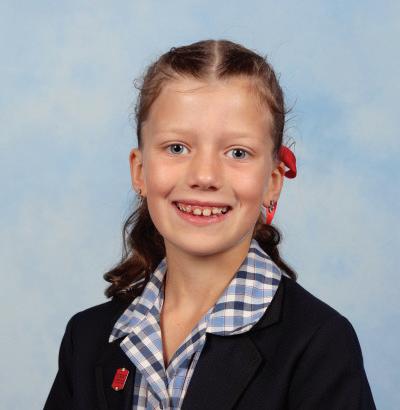
I enjoy sharing my achievements with my friends such as being named double state champion for both my calisthenics solos in the top age division. This has come with a lot of hard work, late nights rehearsing and commitment. I am very proud of myself. When I grow up I want to be a dancer, I really like it.
In the future I am looking forward to being a ‘big buddy’ at Toorak so I can teach younger students how to learn as encouraging others is important to me.

When somebody asks what “tomorrow” means to me, I don't just think of another day, I rather like to think of it as a day to start over, a chance to put the past behind us and focus on the present and future. Tomorrow means that I get to experience new opportunities, challenges, to learn from my mistakes and to keep moving forward.
Toorak has taught me about the value of perseverance, it has taught me to never give up even if the outcome wasn't what I expected or I didn't get what I was hoping for. Every day Toorak reminds me to keep trying, to stay open to new ideas, to learn from my mistakes and to keep pushing forward.
TOORAK COLLEGE Collegians
CLAIRE BULL (NEE LOMBARDOZZI) DIRECTOR SUSTAINABILITY AND INNOVATION — EXTOLLA Collegian (TC 2000)
I have had a very non-linear career, which is now increasingly common but wasn’t something I was aware of in my time at school. A non-linear career is built by taking chances and following your passion rather than the well-worn path of others. It is not about climbing each rung of a ladder but rather about building up blocks of skills and applying them across industries and opportunities.
I started caring about sustainability and climate change very early on; my father owned a recycling business and I used to work there during the school holidays while I was at Toorak College. I believe I started in sustainability ‘before it was cool’ – in fact, at the time it was a little bit uncool. As with any new, innovative, or developing industry, there is a large focus on educating other people about what you are doing and why, before you even get to make things happen. I learnt early on that it was important to tell stories about the effects of climate change and the small part each person could play. At my first corporate job, I was lucky enough to be at the intersection of sustainability and technology. I was helping large corporations, governments and schools launch recycling programs. At that time, there were a lot of sustainable technologies available but not many of them were commercially viable – it was cheaper to ruin the planet than to help it. Many companies were not motivated to change their processes or invest in new technology to reduce their impact on the environment.
After I had my first child, I was presented the opportunity to work at a little startup called Frank Green – now a very wellknown global consumer brand. I was brought on as their Chief Operating Officer and first employee. As I had only ever worked in a multibillion dollar company and also had my three-monthold daughter in tow, I was taking a big risk. I was driven by their mission to create sustainable, reusable coffee cups and drink bottles in a stylish way so that they were adopted and embraced by the mass market. I loved the ‘little bit of everything’ I got to do as part of a startup. It was in stark contrast to my corporate career where I had a human resources department, a legal department and a marketing department to call on – suddenly I WAS all these departments and more.
My next chance came right after I had purchased my dream home in Melbourne and had a second child. There was a job opportunity in Singapore for my husband – did I want to move my very young family to a country I had never been to? Sure. This experience gave me a global view of available technology and I was able to bring this experience back to Australia. I now invest in and mentor female-led technology businesses and work as a Director of Sustainability, Innovation and Technology, helping large businesses reduce their carbon emissions – something they are now ready to invest in. Rather than being linear, my career has come full circle and I couldn’t be happier about that.

A non-linear career is built by taking chances and following your passion rather than the well-worn path of others.”
WHY OVERPARENTING IS HOLDING CHILDREN BACK
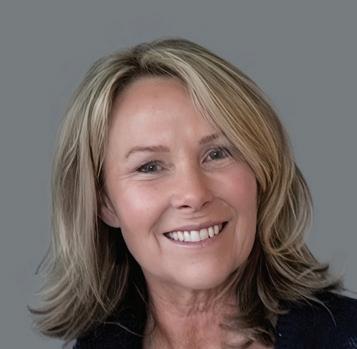
BY JULIE LIPTAK
Speech Pathologist and Toorak College Learning Enhancement Consultant
Sometimes we just want to swoop in and fix things for our children. Maybe your Year 3 daughter comes home upset. She was told off for talking in class and she insists it wasn’t her fault. You believe her, so you fire off an email to the teacher and post about it in the class WhatsApp group.
Or your Kinder-aged son is clinging to you at drop-off. He’s the youngest, and you don’t mind carrying him in – after all, he’s still your baby.
Then there’s your Year 7 daughter who missed out on a lead role in the school musical. She’s heartbroken and says the student who got the role isn’t as good. You call the school, wanting to speak to the teacher in charge.
These moments all come from a place of love – but they’re also examples of what’s known as overparenting.
It’s hard to see our children face disappointment, unfairness, or challenges. We want to make things better for them. Dropping off a forgotten lunch or PE uniform seems like no big deal, and stepping in to speak to a teacher can feel like we’re just being supportive. But when we constantly protect our children from life’s bumps, we’re not doing them any favours in the long run.
In fact, research shows that children who grow up with overprotective parents may find it harder to cope later in life. They can struggle with confidence, peer relationships, and problem-solving. They might also experience more anxiety and have lower self-esteem – both in school and later as teenagers and young adults.
So, what can we do instead?
We can still be loving and supportive parents – just in a different way. Rather than fixing problems for our children, we can help them learn to manage challenges on their own. This builds emotional resilience and confidence.
Parenting isn’t about making life perfect for our children. It’s about helping them become strong, capable people who can handle the ups and downs of life – with us cheering them on from the sidelines.”
If your child comes home upset, acknowledge their feelings: "You look really sad. That must have been hard." This shows you're tuned in and that you care. For older children, you might help them to problem-solve by asking, "What do you think you could do next time?" This helps them start to think through solutions and grow from the experience.
By supporting our children in the development of their emotional intelligence, we are teaching them to sit in discomfort while acknowledging how they are feeling. We are teaching them to use their emotional awareness to guide them when solving problems and keep distress from overwhelming their ability to think.
Parenting isn’t about making life perfect for our children. It’s about helping them become strong, capable people who can handle the ups and downs of life – with us cheering them on from the sidelines.

BY JENNA GREEN Deputy Head of Senior School - Personal Growth
In today's fast-paced world, we're constantly seeking ways to empower our students not only to succeed academically but also to thrive in all aspects of their lives. As educational leaders, we know that building resilience and success goes beyond grades or test scores. It’s about nurturing their curiosity and building their confidence as people and as learners. To help students recognise and reach their potential, we can guide them to understand how success is connected to the integrated principles of a growth mindset, neuroplasticity, and psychological flexibility.
Imagine a student faced with a challenging task. Do they shrink away, convinced they can't do it, or do they embrace the challenge, believing they can learn and grow? This difference hinges on their mindset. A growth mindset, championed by psychologist Carol Dweck, is the belief that abilities are not fixed, but can be developed through dedication and hard work. When students adopt this perspective, they see challenges as opportunities for growth, fuelling their motivation and persistence.
But is belief alone enough? Explicitly teaching students to understand the science behind how learning occurs gives them the ability to control aspects of their own learning journey. Neuroplasticity, the brain's ability to reorganise itself by forming new neural connections, provides the biological foundation for growth. Every new skill learnt and every problem solved strengthens neural pathways, demonstrating that intelligence is malleable. By understanding this, students are empowered to see their brains as dynamic and capable of continuous development. In turn, this understanding helps them adopt that growth mindset.
The journey to success is rarely without its bumps; students are certain to face obstacles and frustrations along the way. This is where psychological flexibility becomes crucial. It's the ability to adapt to changing situations, accept discomfort, and take actions to move forward. Psychological flexibility helps students navigate failure, stress, and negative emotions without losing their motivation. It enables them to bounce back, adjust their strategies, and continue their learning journey.
When these three concepts come together, they create a powerful synergy. A growth mindset fosters the belief that progress is achievable. Neuroplasticity offers the scientific foundation for that growth. Meanwhile, psychological flexibility gives students the emotional strength to overcome obstacles and keep moving forward.
As a school community, we are committed to cultivating these qualities in our students. We are creating learning environments that celebrate effort, encourage exploration, and embrace mistakes as learning opportunities. We are explicitly teaching students about cognitive science, empowering them to understand their own brain's potential. We provide them with the tools and support they need to develop psychological flexibility, enabling them to navigate life's inevitable ups and downs and equipping them with the essential skills they need to become lifelong learners and successful individuals.
By Naomi Linssen Deputy Head of Wardle House
As members of the first generation raised in a fully digital world, today’s young learners have grown up with artificial intelligence (AI), smart devices, and social media as an everyday norm. Their exposure to these tools from a young age has helped them develop unique strengths in digital literacy and visual learning, alongside impressive technical capabilities. However, for students to truly flourish in the information age, these skills must be paired with a more holistic understanding of the world and of their own wellbeing.
Those born after 2010 will need a mix of technical and interpersonal skills to thrive in a rapidly changing world. They’ll need a solid grasp of coding principles to adapt to a technologically driven environment, and they’ll need to master STEM subjects and data analysis for future careers in many fields, including robotics and AI. At the same time, Gen Alpha will require strong interpersonal and face-to-face communication skills for effective teamwork and collaboration, and sharp critical thinking and problem-solving abilities to navigate complex challenges. Understanding and connecting with diverse perspectives will be key to building strong relationships and fostering successful collaboration.
Given their enthusiasm for innovation and entrepreneurship, this new generation is well-positioned to adapt and embrace the opportunities that emerging technologies offer. Their creativity and forward-thinking approach can empower them to develop solutions and generate fresh ideas. Additionally, their heightened awareness of global issues and their role in an interconnected world may foster a stronger interest in social and ethical justice than we’ve seen in previous generations.
With the intensity and pace of digital life, it’s just as important to prioritise online safety and mental wellbeing as it is to build new skills. In fact, this is essential to the overall health and development of the next generation. So, as parents and educators, what role do we play in this evolving landscape?
Rather than demonising technology, we should focus on its mindful application and use strategies that will empower children to thrive in a technologically integrated world. Establishing tech-free zones such as the dinner table and in bedrooms encourages family interaction and uninterrupted sleep. Setting limits, and sticking to them, on the length of time that children (and adults) use screens each day develops self-regulation and healthy interests in other activities. We can maintain a ‘produce rather than consume’ mindset by using apps that encourage creative, design, educational and productive activities. We can encourage offline interests by unplugging from screens and being role models who show our students how they can balance digital device use with tech-free activities throughout their days.
Even though Gen Alpha has experienced greater digital immersion than any prior generation, our role as parents and educators is to guide them in establishing enduring habits that will benefit them throughout their lives. By fostering responsibility and encouraging mindful, purposeful, and timeconscious device usage, including the practice of disconnecting, we can help them cultivate a healthy and balanced existence both online and offline.
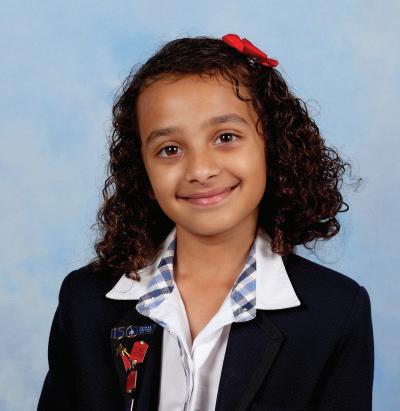
Tomorrow means the next step of a big adventure, overcoming fears and a new day of friendship. When I grow up, I would like to be a tennis player and a doctor. I’m going to achieve this by studying hard at school, challenging myself with different opportunities and never giving up on my dreams. I have tackled obstacles like exams, sports competitions and way more by believing in myself and learning from my mistakes. I’m always pushing myself to the limit by striving to be the best person I can be. My friends, family and teachers are always there to support, extend and guide me on my epic journey and goals.
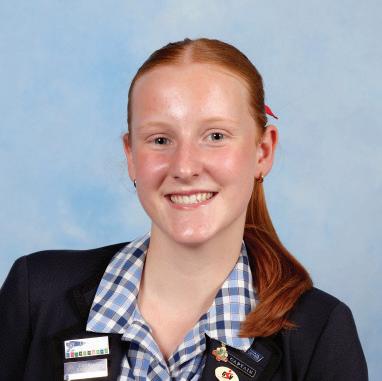
Year 12 is undoubtedly a challenging year, and I feel fortunate to be entering it with a degree of preparedness thanks to lessons learned previously. Taking on two Year 12 subjects in Year 11, while demanding, provided invaluable experience in managing my time effectively. This helped me learn to prioritise my studies while still maintaining involvement in activities I enjoy, like sport. These skills have also been helpful in my leadership responsibilities this year as Sport Prefect and Captain of Basketball and Volleyball. I believe this balanced approach has been beneficial so far and will continue to support me as I pursue my aspiration of studying medicine and working towards becoming a doctor.
TOORAK COLLEGE Collegians
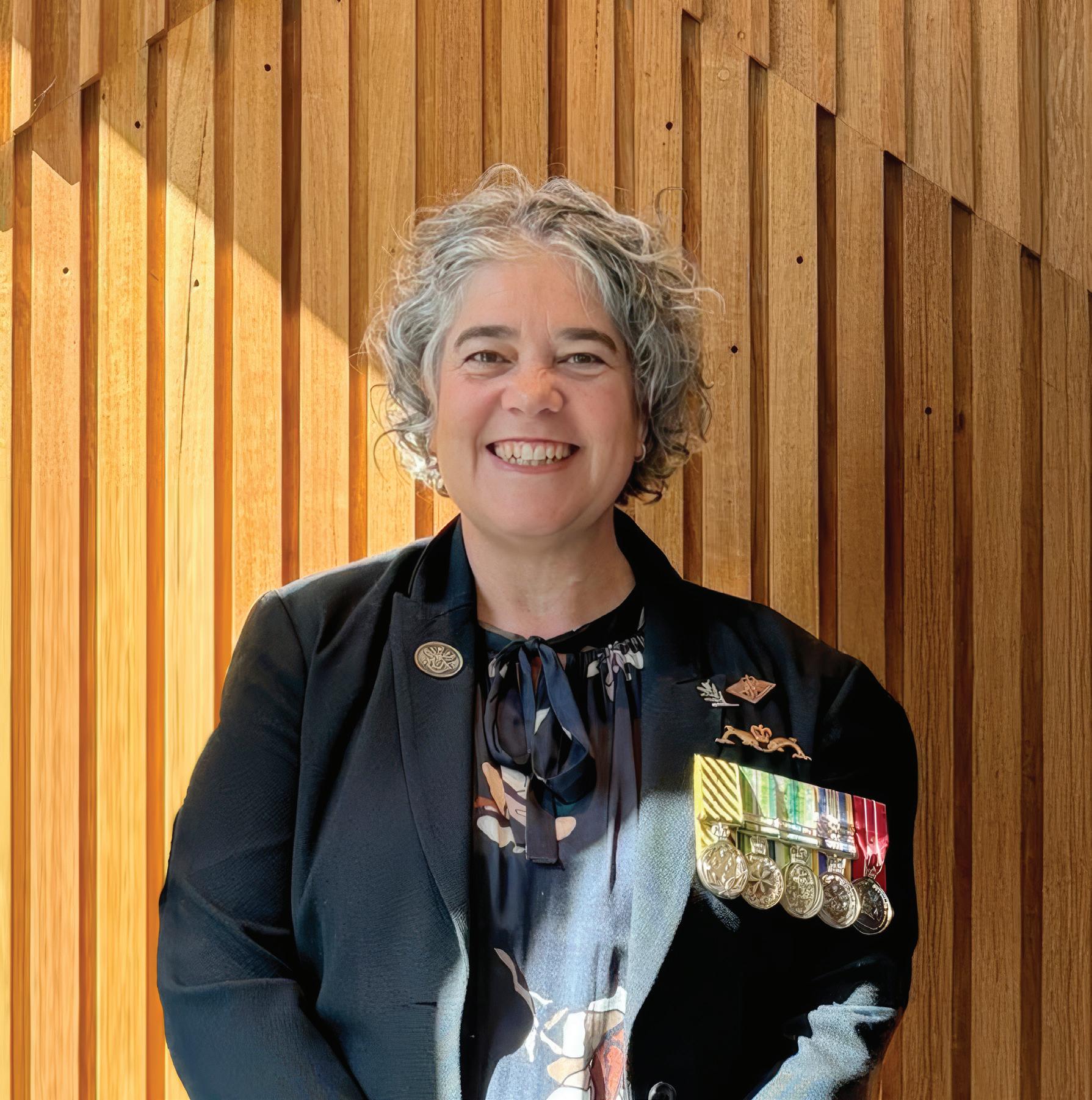
A JOURNEY FROM TOORAK TO THE NAVY AND BEYOND
SUSAN HARRIS
ROYAL AUSTRALIAN NAVY Collegian (TC 1993)
In 1993, a Navy Seahawk helicopter landed on the lower sports ground and presented me with a scholarship to the Australian Defence Force Academy. I joined the Navy as a Maritime Warfare Officer shortly after finishing school and remained there until June 2024 when I retired. Throughout my career, the skills and values I learnt at Toorak served me at every turn. I carried them into every submarine, leadership challenge, and tough decision. The school's core values align with those in the Navy and the ANZACs, values I hold dear: resilience, adaptability, courage, integrity, and loyalty.
My career in the Navy has been marked by many groundbreaking achievements. In 2000, I was among the first women to join submarines, and in 2004, I became the first female Submarine Warfare Officer. I became the first female Executive Officer on an Australian submarine in 2018 and the first woman to attempt the Submarine Command Course in the Netherlands in 2019. These milestones were built on the foundation laid at Toorak College.
But I have had two parallel careers, and my biggest successes were not at sea, but in effecting change in the workforce. Throughout my career, I alternated sea time with my husband, a submarine engineer. In my periods ashore, I looked after our three children and became a Strategic Human Resources Specialist, achieving Fellowship of the Australian HR Institute in 2020. In this role, I effected significant change in the submarine workforce, focusing on future growth. In 2017, I was a finalist in the Telstra Business Women’s Awards, and in 2018, I received a Conspicuous Service Medal for my work in Strategic Submarine Workforce Management. I was then in the right place at the right time to plan for the new workforce we needed for the acquisition of Australia’s future nuclear submarine force.
Joining the Navy in the early 1990s, when women were limited in the roles they could pursue, required courage. I faced scepticism and doubt but believed in the possibility of change. Courage also meant standing up for what was right, calling out bad behaviour, and speaking the truth, even when it was unpopular. It meant saying yes to opportunities and roles that pushed my limits, from becoming a fighter controller to navigating a Dutch submarine through a Scottish river.
Bravery often meant trying and failing, but each experience contributed to my growth. The ANZACs were known for their ingenuity, and I carried that spirit throughout my career. Whether facing high-pressure situations or designing a new model for managing the submarine workforce, thinking differently made a significant impact (a dogged determination to get things just how I wanted them also helped).
Resilience and flexibility were also vital in overcoming setbacks. The Submarine Command Course in the Netherlands was one of the toughest challenges you can imagine. Despite giving it my all, I failed on the last day. However, I picked myself up, made a new plan, and found a new path that allowed me to serve in different ways.
Loyalty to my values and friends was paramount, as was building myself into the kind of leader I wanted to be. In the Navy, loyalty meant standing up for my people and creating inclusive teams. This lesson was taught at Toorak, where inclusion and encouragement were key. It also meant creating workforce systems that were fair and just, even if I didn’t actually benefit from them personally.
Every time you show up with integrity, try something new, ask for help, or simply be kind, you continue the legacy of Toorak College. You embody the ANZAC spirit and become a changemaker. Dream big, be bold, embrace challenges, and most importantly, be yourself. The world is waiting for someone like you to lead and make a difference.
Dream big, be bold, embrace challenges, and most importantly, be yourself.”

EMPOWERING THE NEXT GENERATION OF LEADERS
BY FIONA WINES Head of Senior School, Deputy Principal
In a world that’s constantly changing, Toorak College is focused on preparing the next generation of leaders: young women who are confident, capable, and ready to make their mark. Our goal is to create an environment that nurtures essential skills, builds self-belief, and encourages bold aspirations, especially in areas where women have traditionally been under-represented.

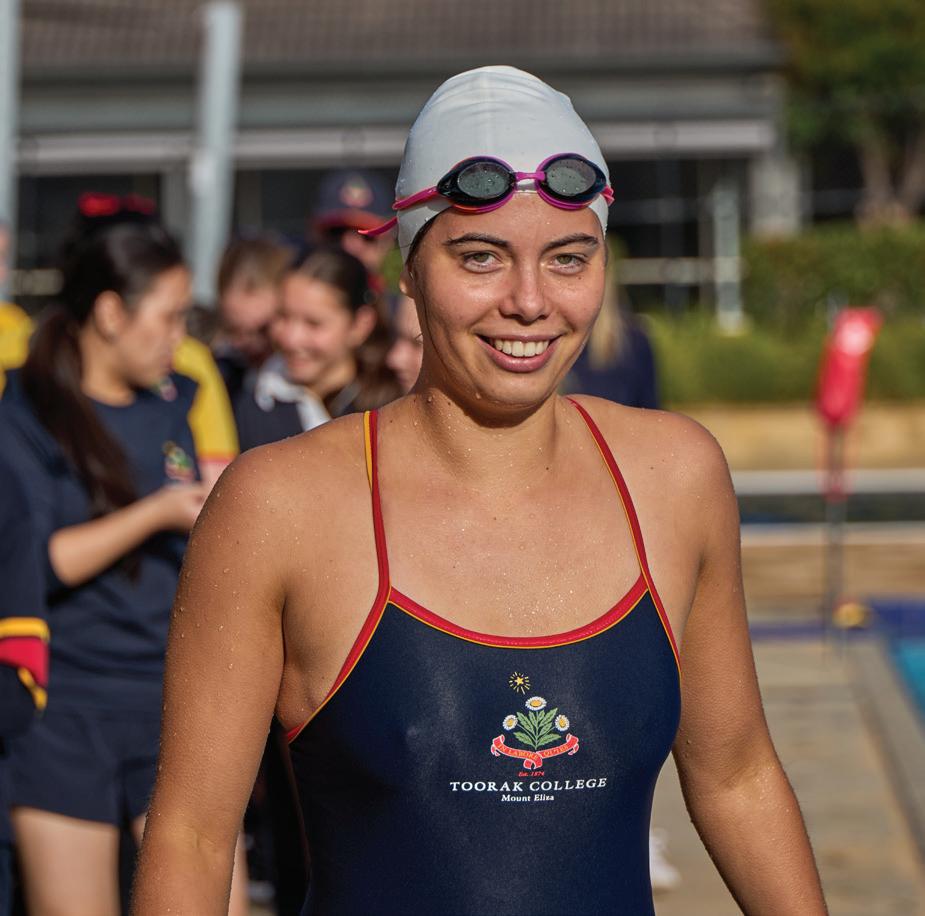

“Young people thrive when they’re inspired to dream big and step beyond their comfort zones.”
Confidence, resilience, and ambition sit at the heart of everything we do. Our curriculum is designed not just to educate but to challenge expectations by confronting bias, encouraging critical thinking, and recognising the unique strengths of each student. We create spaces where girls feel supported to take risks, explore their goals, and develop a strong sense of self. When they encounter setbacks, we help them build resilience by framing these setbacks as stepping stones, not roadblocks.
Young people thrive when they’re inspired to dream big and step beyond their comfort zones. Whether students are on stage, out on the sports field, deep in debate, or creating something that matters to them, co-curricular activities give them the chance to discover what they’re passionate about and grow through meaningful achievement. These experiences help them gain confidence through effort and perseverance, which builds resilience, leadership skills, and a clearer sense of who they are.
Leadership is a key part of the Toorak experience. We offer opportunities at every year level for students to step up, speak out, and make a difference. Just as importantly, we explore what leadership actually looks like today, where empathy, collaboration, and emotional intelligence are at the forefront. By encouraging authenticity and embracing different leadership styles, we help students understand that leading with integrity is what truly makes an impact.
Strong role models matter, which is why we actively connect our students with women who are truly making their mark as leaders and innovators across diverse industries such as Engineering, Robotics, Tech and Finance. Hearing directly from those who have navigated challenges, especially in historically male-dominated fields, does more than just challenge stereotypes – it reshapes what our students believe is possible for themselves, giving them the confidence to pursue their own ambitions.
When a school provides opportunity, support, and vision, it becomes more than just a place to learn – it becomes a launch pad for what comes next. At Toorak College, we’re committed to helping every girl find her voice, realise her potential, and lead with purpose, whether that means taking a seat at the table or building an entirely new one.
BY MELISSA SCHOORMAN Head of Wardle House, Deputy Principal
In today’s fast-paced and ever-evolving world, success is no longer defined by perfection. It is instead judged by our resilience and our ability to learn, adapt and grow from every experience and, in particular, our capacity to overcome obstacles. This is where the concept of failing forward becomes so powerful. Failing forward encourages us to see setbacks not as stop signs but as stepping stones to something greater that will result in longterm success.
At Toorak College, we are constantly reminded to embrace this philosophy. From the classroom to the sports field, we are taught that failure is not something to fear but something to understand, face head-on, and grow from. Whether the issue is struggling through a challenging maths problem, running out of time in an assessment, or missing a crucial goal, we encourage our community of learners (both staff and students) to reflect, adapt, and try again. This mindset builds something far more valuable than temporary success: it builds true, lasting confidence and a desire to continue the momentum that’s been created.
Thomas Edison, the famous inventor, once said, “I have not failed. I've just found 10,000 ways that won't work.” His words capture the spirit of perseverance and reflect the mindset we strive to nurture in each of our students every day. Edison’s story reminds us that even the greatest achievements are built upon countless moments of trial and error. It serves as a reminder that the key to growth lies not in avoiding mistakes but in learning from them. Every setback carries the opportunity to improve and to become more knowledgeable, stronger, and more prepared for future challenges.
Our teachers and families play a vital role in nurturing this mindset. We help to create an environment where mistakes are seen not as embarrassments but as natural parts of the learning process. We encourage students to ask questions, experiment, take risks, and not shy away from a challenge. Our Toorak pillars guide this approach as students are empowered to take intellectual and creative risks, to ask questions, and to explore new paths, even when success is not guaranteed. By normalising setbacks as part of the process, we pursue a deeper kind of learning – one that supports both academic and personal growth.
This philosophy ultimately helps our students thrive, not just within the school environment but in their lives outside of it. In the real world, failure is inevitable; however, those who learn how to fail forward are the ones who turn those moments into breakthroughs. They are our innovators, our problem-solvers, and our future leaders.
As a community, we take pride in fostering an environment where it is safe to try, safe to fall, and, most importantly, safe to rise again. As the adults that our students look to for guidance, we need to be seen actively encouraging one another to approach challenges with courage and curiosity. Every time our students choose to ‘fail forward’, they take one more step toward becoming capable, confident individuals ready to meet the future and its challenges head-on.
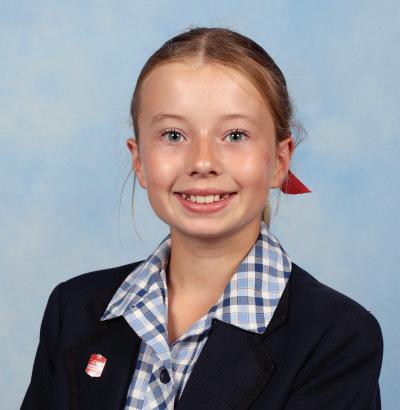
Tomorrow means many things to me. It could be to step out of my comfort zone in the musical or to set goals for my future but I think it is really about trying new things and challenging myself. It could be something small like playing a different position in netball or something life-changing like going to a new school. Last year I was new to Toorak College and I was so nervous because everything was so different. I shouldn’t have been worried because now I have great friends and I am really happy. I think that tomorrow means a fresh start with new challenges to face and goals to accomplish.

For me, tomorrow is a pot of opportunities, brimming with adventure, a spice of promise and a large sprinkle of mystery. It is unbridled by today’s worries, a clean slate that can be moulded into something brighter, bolder, and entirely your own. I look forward to tomorrow—the people I’ll meet, both in and beyond school; the milestones I’ll reach, whether personal or academic, grand or modest; and the places I’ll travel to. Tomorrow isn’t just a word, it's a promise of adventure, it is a curious mind’s dream. I have dreams, bold dreams, dreams so large they might seem unrealistic. Maybe they are, maybe they aren’t, but it doesn’t change that tomorrow is a step closer towards them.
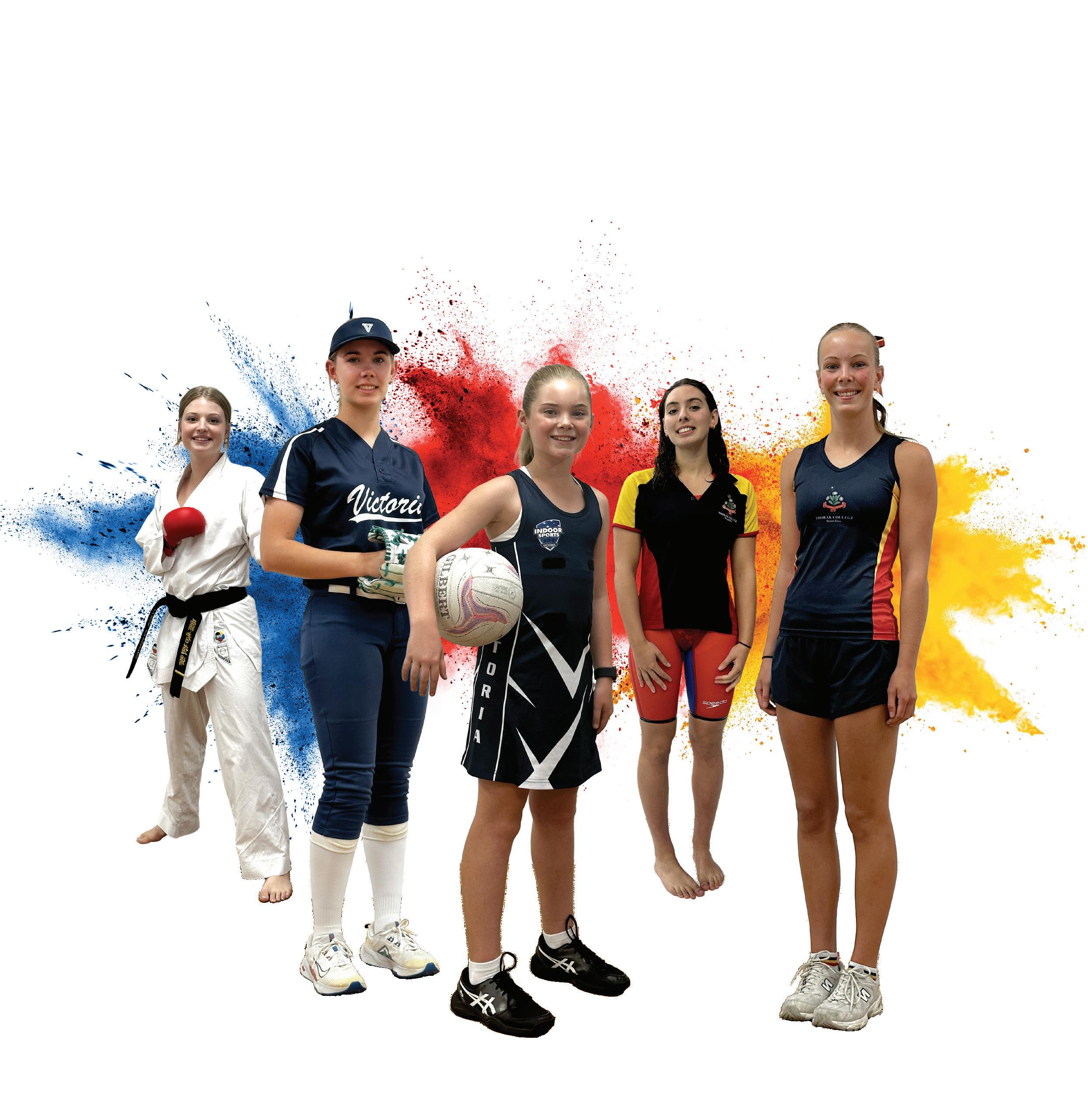
BY LIBBY LEWIN Head of Sport
At Toorak, sport is more than a fixture on the calendar – it’s a living expression of resilience, discipline, and the drive to push beyond limits. Whether training at dawn, leading on the field, or advocating for change, our student athletes are doing far more than competing. They are shaping culture, setting standards, and showing us what’s possible when passion meets purpose. This year, five students – Mae, Jade, Lucy, Sierra, and Madison – have exemplified the very best of what it means to be a Toorak athlete.
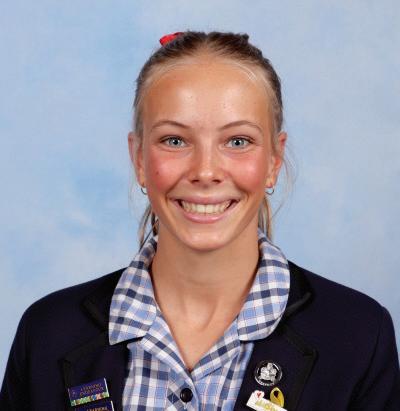

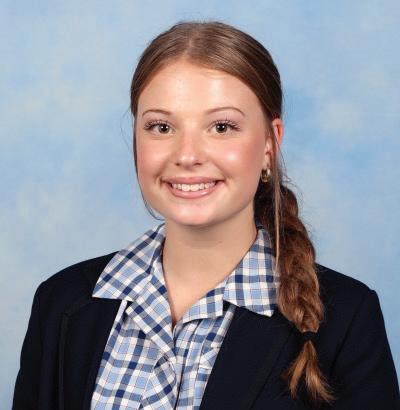


For senior student Mae, balance is a daily discipline. A dedicated surf lifesaver who trains with the elite squad at Mentone Life Saving Club, Mae doesn’t just chase waves – she conquers them. Her commitment to surf lifesaving, a demanding and physically intense sport, is made all the more impressive by her equally strong dedication to academic excellence and representing Toorak in team activities.
Mae’s influence stretches far beyond the beach. As Sport Prefect and Captain of Cross Country, she is a visible and vocal leader in the Toorak community. Whether she's cheering teammates across the finish line or mentoring younger athletes, Mae’s leadership is defined by humility, encouragement, and an unshakable work ethic.
When Jade steps onto a netball court, it’s more than a game – it’s a mission. As the founder of Netball is Life, she’s turned a school project into a national movement. Jade has designed a range of T-shirts and hoodies, with all profits supporting Netball Victoria’s Jean Cowan Fund, which helps underprivileged girls access the sport. So far, she’s raised over $4,000 and aims to reach $10,000.
Jade recently opened the Netball Australia conference, filmed a national feature with her father Dean on the role of dads in girls’ sport, performed the anthem at the State Titles, and will soon MC a Vixens home game. She also serves on the Casey Netball Youth Advisory Committee, representing the next generation of changemakers.
Her upcoming trip to Paris for the World Netball Youth Club Championships marks another milestone, as she prepares to mentor girls from refugee and asylum-seeking backgrounds through a powerful community netball initiative.
In the world of martial arts, strength is more than physical – it’s mental, emotional, and deeply personal. For Lucy, a committed karate athlete, that strength has been tested and proved through both triumph and adversity. After recovering from a significant injury, Lucy made an incredible return to national-level karate competition, a testament to her grit and perseverance. She has also reached the international stage, recently competing in the USA Open Karate Tournament and winning a silver medal.
Lucy’s resilience shines through in everything she does. With karate, rowing, and academic commitments all in motion, she continues to show that true excellence is built in quiet moments of discipline and unwavering belief.
Sierra isn’t just an athlete – she lives and breathes sport. As captain of both the Girls Sport Victoria (GSV) Representative Softball Team and Toorak’s own squad, she leads with determination, encouragement, and integrity.
Her dedication to mentorship is equally inspiring. Whether coaching juniors or guiding peers, Sierra helps foster a culture of growth, confidence, and passion for the game.
A true all-rounder, Sierra also captains the school’s indoor cricket team and competes across an impressive range of sports: athletics, swimming, hockey, surf lifesaving, triathlon, AFL, cross country, water polo, badminton, soccer, and volleyball. Her top 10 GSV Javelin finish is yet another example of her relentless drive for excellence.
With the open water stretching endlessly ahead, Madison feels at home. Crowned Australian 16-Year-Old Champion in the 5km Open Water Swim, Madison is redefining what endurance and focus look like in youth sport. Her victory represents more than just a national title – it speaks to years of training, resilience, and laser-sharp mental strength.
Madison's talent extends across many arenas. She represents Toorak in athletics, volleyball, and water polo, and was a standout at the GSV Swimming Finals Night where she qualified in four events and brought home a bronze medal, confirming her status as among Victoria’s best.
Whether in the pool or on the court, Madison's fierce competitiveness is matched by her grace and team-first attitude. She is a shining example of what happens when passion meets perseverance.
TOORAK COLLEGE Collegians
JENNIFER WATT CEO OF THE NORTH MELBOURNE FOOTBALL CLUB Collegian (TC 1995)
My parents sent me to Toorak College in Year 11 because I was, quite frankly, ‘cruising’ at the local high school. It was a rude shock when I arrived at Toorak. My grades plummeted from straight As to Cs and Ds. The standards at Toorak were a lot higher than they had been at my previous school.
I had selected a range of subjects to undertake in Year 11, including a Year 12 History subject. The teacher of that subject was not pleased that a girl ‘from the high school’ should assume she was capable of taking on this subject. I made it my mission to prove her wrong.
I was fortunate that I knew many of the girls when I arrived at Toorak. I had attended both Kunyung Primary and Derinya Primary schools, so there were plenty of familiar faces. I was thrilled at the sporting opportunities and facilities offered at Toorak and promptly signed myself up for as many teams as possible. An aerobics enthusiast, I was delighted that there were aerobics classes before school, three times a week. My mother probably wasn’t as thrilled about the early morning drop-offs. At least I wasn’t a swimmer!
I navigated my way through Year 11. By the end of that year, I had resurrected my academic performance, convinced the history teacher I was worthy of her class, and fully entrenched myself in all of the terrific activities Toorak had on offer. I also had a lovely group of friends who I am still close with today.
The transition to Year 12 was interesting. I was voted in as a prefect by my peers and felt proud to have established myself as a leader within 12 months. However, not everyone shared that sentiment.
There were concerns whether someone who had only been at the school a short time should hold the role and I was asked to write a letter to the Principal explaining why I should retain the position.
In my letter, I described the challenges of changing schools and the efforts I’d made to contribute to the school community. I also shared a similar experience from Year 5, when I had become a House Captain a year after switching primary schools. The Principal was pleased with the letter and was supportive of me retaining my position.
Having experienced both a public school and a private school, I was very aware of the additional benefits that Toorak offered me and very grateful that my parents had invested in me in this way. The teachers, the facilities, and the sporting opportunities were all a cut above and I am quite sure that the two years I spent at Toorak considerably lifted my final grades in Year 12.
I already had the idea in high school that I wanted to work in sport, as I loved it so much. I was also very clear that my athletic ability would not deliver me a career in sport! I was a heart and soul participant but never the best in any team.
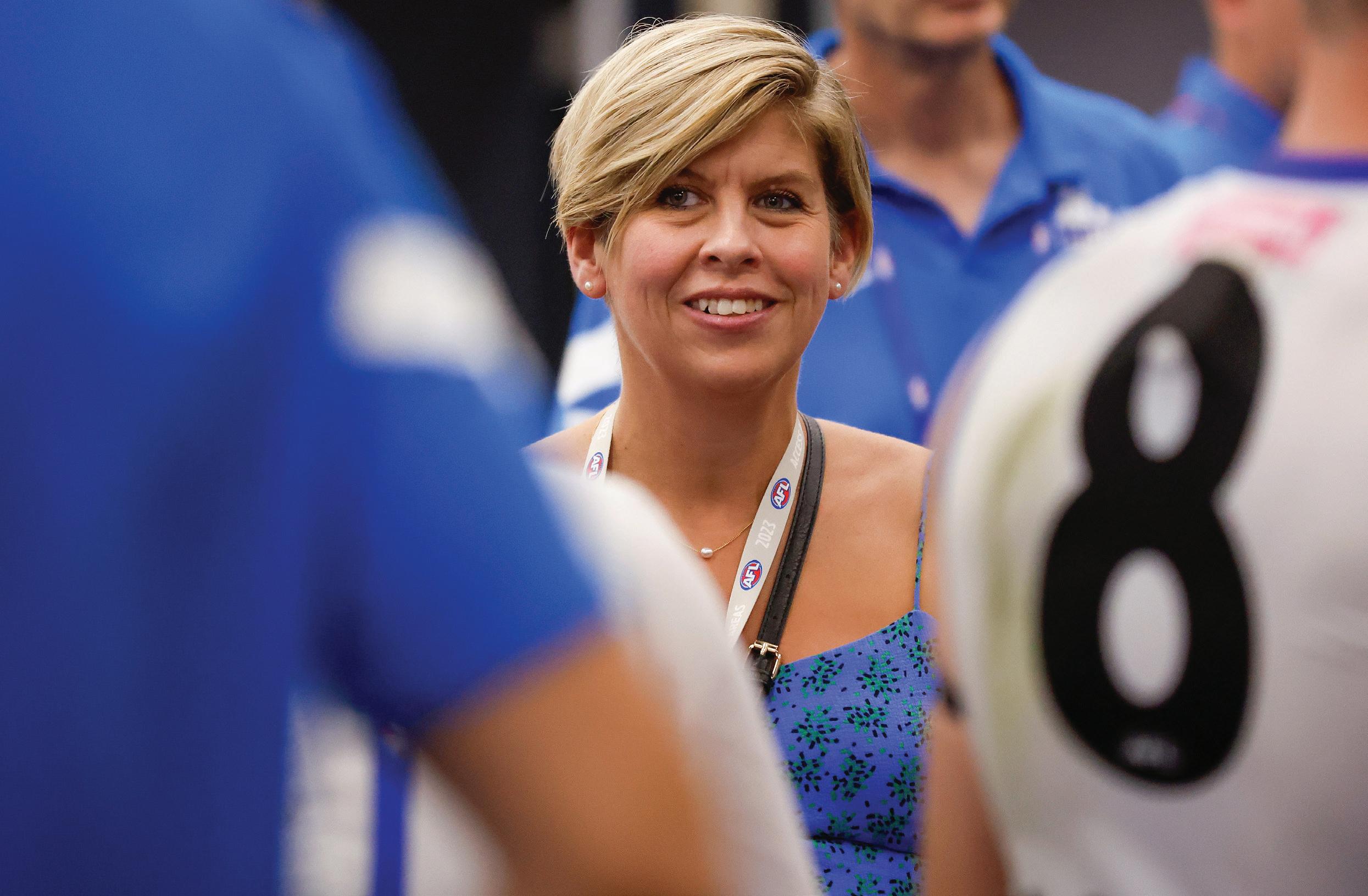
I had identified that there was a commerce degree at Deakin University that offered a major in sports management – the only degree of its kind back then. I can’t even remember writing down any other courses I was interested in; I had my heart set on this one. It was my only ambition. Fortunately, I was accepted into that program and have been able to work in sport for my whole career. I started at Melbourne Sports and Aquatic Centre, then spent 14 years at the Melbourne Football Club and five years at the Melbourne Cricket Club. I have been at the North Melbourne Football Club, in my current role as CEO, for just over two years. I feel incredibly privileged every day that I get to hold this position at this amazing club in this much-loved game. I am the only female CEO of a club in the AFL, which I’m very proud of, but I also look forward to the day when I’m not an exception. I’d never had a particular ambition to be CEO of an AFL club, probably because I couldn’t imagine it when I was at school and there were only men in positions of leadership across the AFL. The game has changed significantly with the introduction of AFLW and women now holding senior positions across the game, although it is clear there is still more progress to be made.
My jobs have delivered me extraordinary opportunities and experiences, none more so than North Melbourne winning the AFLW Premiership in 2024. It was the culmination of years of work by the team and club, and to be part of a premiership is something I will never forget (and given that I got my first ever tattoo after the win, I am unlikely to).
The premiership is hard to beat but being part of football events such as The Big Freeze at the G, Pink Lady matches, ANZAC Eve, Grand Final days, and all of the other incredible sporting and entertainment events that happened at the MCG while I was there, along with all of the amazing people I have got to meet and work with, have provided me with a very fulfilling and enjoyable working life.
My time at Toorak College, even though only for two years, was incredibly important in not only helping me reach my academic potential but also for the broader lessons I learnt about resilience and adaptation. Changing schools at 16 is as hard as it is at 11. I built a lot of muscle in those two school transitions around my ability to influence people, join existing groups, and break into established environments, something I have leaned on heavily throughout my career.
As I prepared to attend my 30-year school reunion at Toorak College recently and I watch my own two daughters navigating their way through high school, I reflect on how deeply the school experience helps shape our future paths. I have come to the view that the very best tool I can arm my daughters with is positive self-esteem and self-belief.
I am now one of those annoyingly smug people who say, “I get to do my dream job every day.” My greatest ambition for the future is that my daughters get to say the same thing about whatever career they decide to pursue.
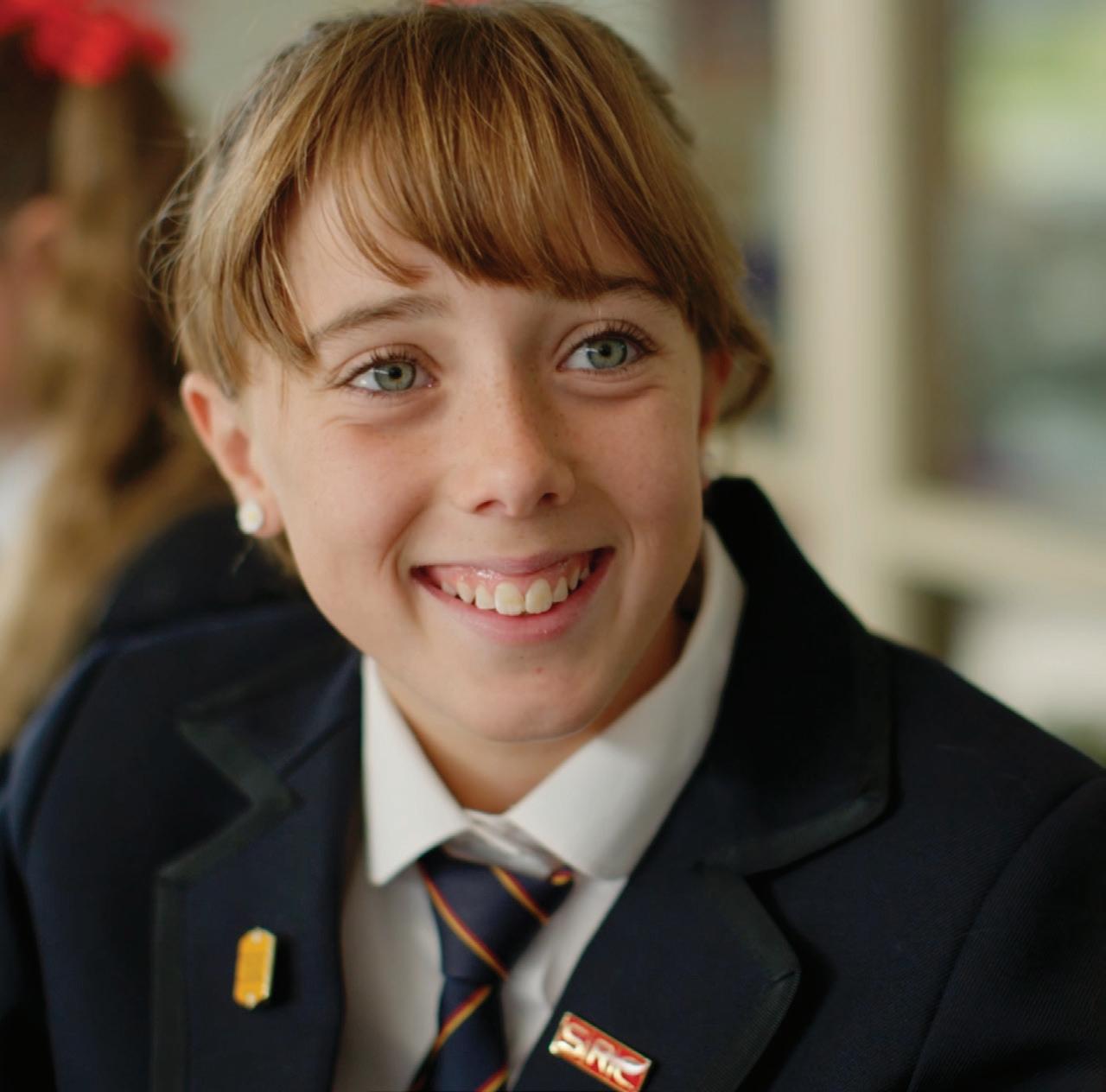
BY EMMA CASTLES Director of Community and Development and Collegian (TC 2001)
Derived from the Greek word philanthrōpía, meaning 'love of humankind,' philanthropy at its core is a celebration of connection, compassion, and the desire to uplift others. When practised, it offers the extraordinary privilege of witnessing the opportunities and transformation that generosity can create. As our world faces complex challenges and our communities grow increasingly interconnected, fostering a culture of giving – especially among young women – is more important than ever. When women are empowered to give, they don’t just uplift individuals – they elevate entire communities. They give with purpose, with empathy, and with vision. By nurturing these values in the next generation, we lay the foundation for a more compassionate, inclusive, and equitable society.
Australia is entering a pivotal era of wealth transfer. Over the next two decades, approximately $5 trillion is expected to pass from one generation to the next, and women are set to inherit the lion’s share – around 65%, or $3.2 trillion, by 2034 (JBWere, The Growth of Women and Wealth). This monumental shift signals not just an increase in financial capacity for women but also a profound opportunity for women to redefine philanthropy in ways that are deeply aligned with the values of community, sustainability, and compassion.
With women poised to become the primary custodians of wealth, they are also becoming the torchbearers of social change. Studies consistently show that women are more likely to give collaboratively, invest in causes that address systemic issues, and support initiatives that build long-term resilience.
Girls’ schools have emerged as powerful incubators of philanthropy. According to recent data from the organisation Australians Investing in Women, more than 75% of philanthropic and corporate organisations now apply a gender lens to their giving, highlighting a strong commitment to causes that empower women and girls.
Schools like Toorak College are uniquely placed to build on this momentum. By embedding the value of giving into the school experience, we are not only shaping the character of our students but also inspiring future changemakers. Whether through student-led fundraisers, partnerships with organisations such as Peninsula Health and Anchor Community Care, or global service opportunities through our Beyond Boundaries program, students are not only developing strong values but also discovering their ability to make a tangible difference.
Our vision is to cultivate thoughtful, engaged, and generous young women who understand that the act of giving, whether through time, resources or talent, can shape the world around them.
We do this by:
Helping students understand the impact of philanthropy, and how generosity has historically advanced education, healthcare, and equality.
We highlight the stories of women whose generosity has transformed lives. Among them are many Toorak Collegians whose support through named scholarships, the Hamilton Society Bequest Program, and investments in new learning and experiential spaces continues to shape the future of our school community.
Offering pathways for students to participate in causes they care about and reflect on the broader impact of their contributions.
As this generation of young women steps into leadership, financial stewardship, and civic responsibility, we have a unique opportunity and responsibility to instil in them the values of empathy, generosity, and shared humanity. A culture of giving isn’t just about donations – it’s about creating a ripple effect of kindness and purpose that can resonate for generations to come.
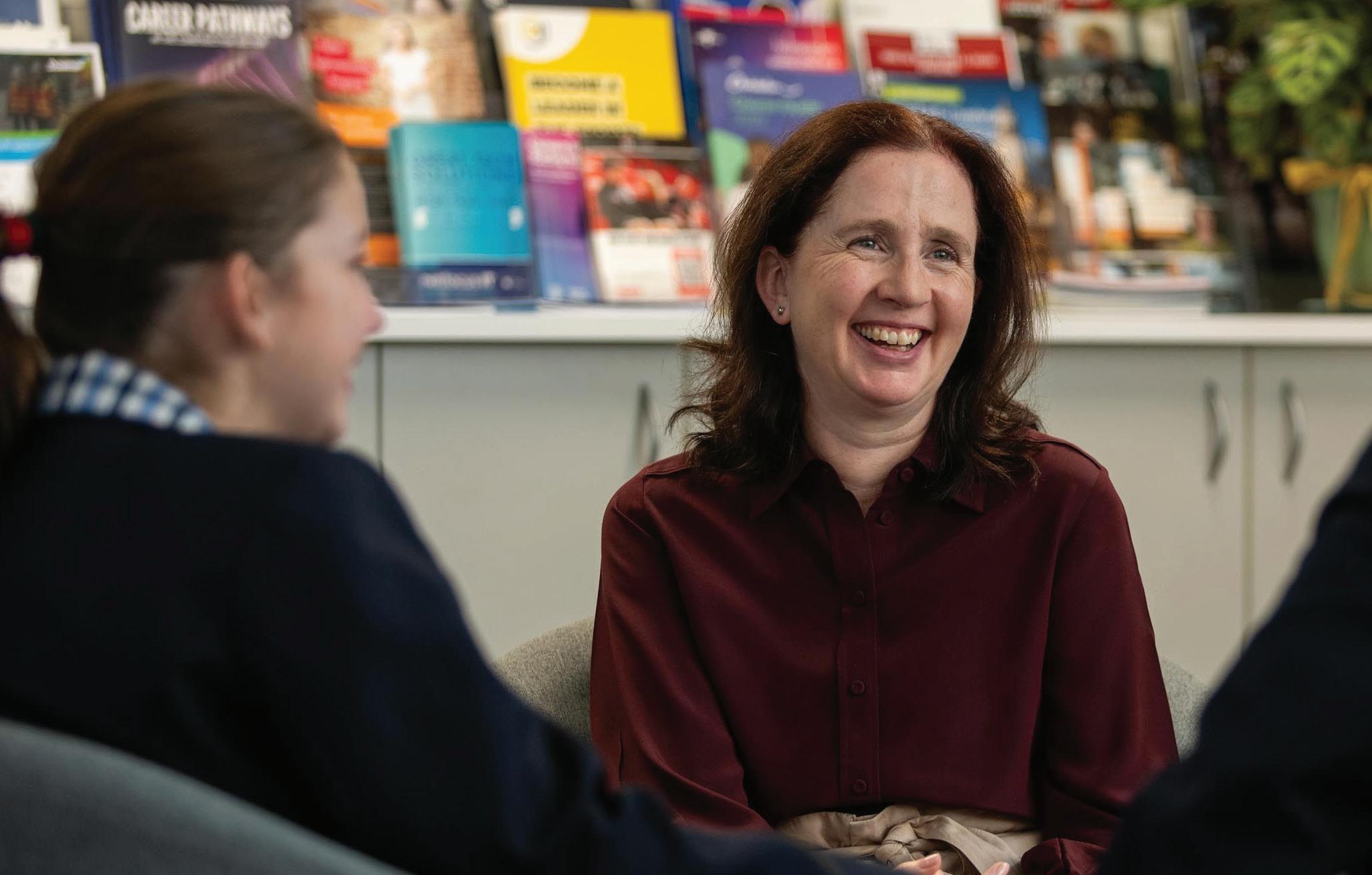
BY JOSIE MONRO Student Futures Specialist
We are living through a period of rapid transformation. While the notion of change itself isn’t new, what is new is the accelerating pace of technological advancement and its impact on the workforce. According to the World Economic Forum’s Future of Jobs Report 2025, technology is the greatest predicted disruptor of the current labour market.
Understandably, the rise of AI and automation may spark concern about the future of jobs. However, the reality is far more nuanced. While more tasks are becoming fully automatable, tasks that require collaboration between humans and machines are also growing. By 2030, it is predicted that tasks will be evenly split into three categories: those handled by people alone, those performed by machines alone, and those achieved through humantechnology collaboration.
What does this mean for today’s students?
Contrary to fear-driven narratives, not all jobs are at risk. Technology excels at predictable tasks, leaving the unpredictable (and deeply human) domains to us.
As James Wright, Engineering Director at Seek, explains, machines struggle with “complex social interaction” and tasks requiring unpredictable “physical dexterity.” Careers involving human care, communication, or spontaneous problem-solvinglike healthcare workers or tradespeople - remain solidly in human hands.
The opportunity, then, is not to resist change, but to evolve with it. Students should prepare for a future where working with technology is just as essential as working with people. Roles such as AI and Machine Learning Specialists will grow, but so too will more general roles that utilise technology to free up time for higher-order thinking and interpersonal engagement.
James Ross, Chief Technology Officer at Seek, highlights the need for a “digital mindset”- not deep technical expertise in every field, but a way of thinking grounded in adaptability, curiosity, and resilience.

Embrace change, be curious, and remain open to new technologies without needing to be a coding expert.
ENGAGE WITH TECHNOLOGY
Identify areas in your work or study where technology can support you, and learn the tools relevant to your goals.
Take initiative - watch a video, enrol in an online course, talk to a professional. If you don’t understand something, make it a goal to learn it.
LEVERAGE YOUR HUMAN STRENGTHS
Build skills in analytical thinking, empathy, creativity, communication, flexibility, and leadership.
FOCUS ON COLLABORATION
By 2030, it is predicted that tasks will be evenly split into three categories: those handled by people alone, those performed by machines alone, and those achieved through humantechnology collaboration.”
Recognise where human insight and machine efficiency can complement each other for better outcomes.
STAY FLEXIBLE AND ETHICAL
Decision-making in a tech-enabled world requires emotional intelligence, ethical awareness, and the ability to adapt.
DON’T FEAR CHANGE, OWN IT
Approach the evolving landscape with confidence. Your ability to learn, connect, and create is irreplaceable.
These very human qualities will always be vital –so be prepared to adapt, be prepared to learn, and above all, be human.
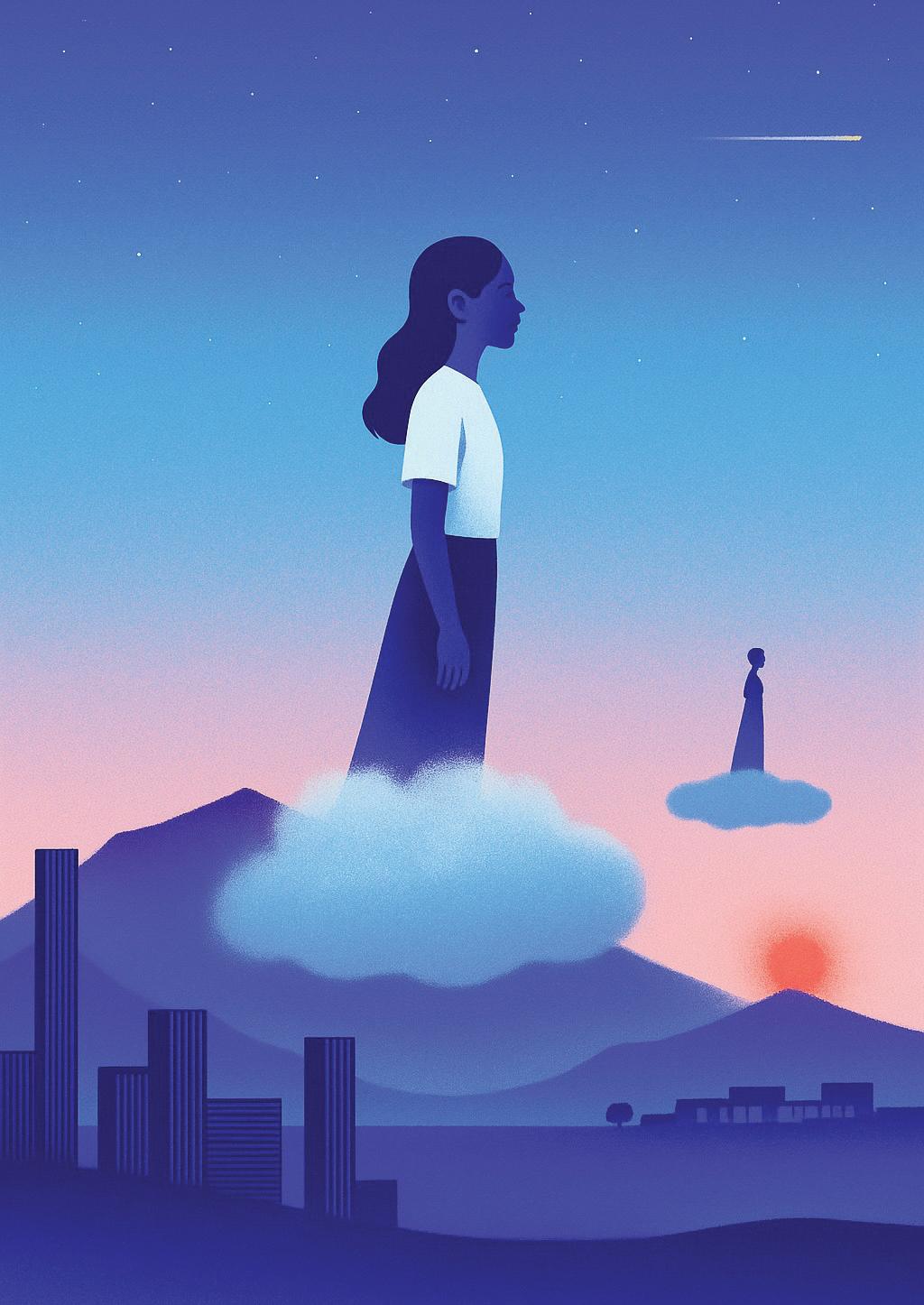
BY KRISTY KENDALL Principal
Recently, my husband bought a 3D printer to have in our home. It really doesn’t match the living room’s colour scheme or vibe, but it has certainly changed the mood of the room. Instead of us all being passive in the space, like watching something on a screen, my family has become active. We look at the printer and we want to use it! It occurred to me that what has happened in our home this week is a shift in priority – we have moved from watching the world evolve to being part of the evolution.
The priorities that have changed in our living room are reflected in the priorities of education today. As my children navigate this new addition to our family home, we’re seeing something unfold that has big implications for their future journey.
Firstly, they have to decide what problem they want to solve. A mount to hang something on the wall, a rack to feed cables through, a way to display a Lego car at the perfect angle? They need to identify the obstacles or barriers currently before them.
Secondly, they need to design the solution. What does the product look like and how big does it need to be? Which elements can be envisaged and which still need to be conceptualised? My children need to consider all the possible solutions that exist, and some that don’t yet exist but might just work.
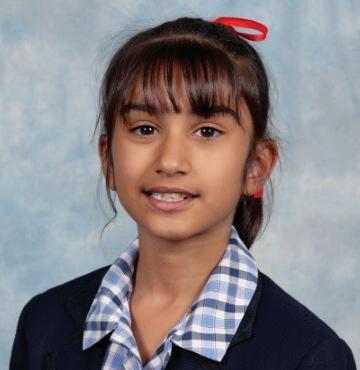
Fast forward to the future—here is who I dream of becoming one day. I am looking forward to becoming a scientist because I want to help the environment, find cures for illnesses and even more! I have always loved the subject Science in class where there are crazy experiments and we are learning so much. In the field of science you can do multiple jobs: Chemistry, Biology, Physics and more. It's all science! But my favorite is Biology where you study living things and lots of plants. It is amazing!
We have moved from watching the world evolve to being part of the evolution.”
Thirdly, they need to iterate and problem-solve. In the first print, what worked and what didn’t? Which assumptions were wrong and how do they adjust the process now? My kids need to learn through trial and error, by talking to experts, by having the resilience to persist through the failed attempts.
Finally, they learn they have the power to solve their own problems. The completed product is evidence that they are competent. They can design, imagine and create their own world. They can try different things until they get a solution that works. They are in control of what happens next.
This not-so-small addition to our living room has also made a not-so-small impact on how we engage with our world. We stand back and marvel about what our grandparents and parents would say if they could see us physically solving the problems before us, and we wonder about what the next iteration of this looks like as we design the world in the image we most wish to see.

To me, Tomorrow represents all the opportunities and memories that future me will get to experience. The endless possible travel destinations, places I will work at, people I will meet, and wonders I will see. The stories and future anecdotes that I will share with my friends and far-off family. Tomorrow is the unfathomably big planet that I am determined to explore. Tomorrow also symbolises the impact I intend to and will have on the world; it is one of my strongest desires in life to be able to help people and the stability of Tomorrow reassures me that I can.
FRAN CATTS (NEE M c CARTHY)
FOUNDER | OLLE Collegian (TC 2001)
I started working in the fashion industry straight out of university – quite a pivot from my Arts degree, but it was meant to be. I had always loved fashion, and ultimately would have made for a pretty rubbish public servant. I got my break in London, after volunteering a day a week at cult denim brand AG Adriano Goldschmied – in between other jobs – until they finally hired me. This came as a great relief after several months living off tuna and rice.
I was lucky enough to work for some incredible companies throughout my career, and when my second child was a little over one, I returned to work as a buyer at Kmart. I was determined to improve the sustainability rating of my department, and we soon managed to reach 100% recycled materials in our activewear range. However, with so much fast fashion heading to landfill every year, the niggling feeling that I was complicit in the issue of global textile pollution was becoming difficult to ignore.
While at Kmart I was invited to work on a project team exploring sustainable innovation in textiles, and was quite shocked by what I learnt. The innovation coming through in textile manufacturing was extraordinary, but the reluctance of big business to take it up was incredibly disheartening – in part due to the fact that consumers didn't really demand it of them.
Customers wanted cheap fashion, often. They weren't concerned with microplastic fibre shedding or the growing problem of non-biodegradable landfill, largely because it wasn’t something they knew a lot about – which is by design. These topics aren’t particularly sexy, and don’t make for feel-good shopping experiences.
Ultimately, after seeing the kilometres of landfill in Dhaka, Bangladesh, I found my line in the sand. I resigned, and decided to launch OLLE. We make slow fashion for fast kids, using certified organic cotton, traceable recycled yarns, and use biodegradable materials wherever possible. It is our belief that fashion should be fun, and individuality celebrated, especially in childhood. Made to last doesn't have to mean here forever.
Looking back, the journey from fashion lover to founder has been anything but linear, but it has been deeply purposeful. OLLE was born not just from a passion for style, but from a conviction that the industry can – and must – do better. Every piece we create is a small stand against the disposable culture that’s become the norm, and a step toward a future where ethics and aesthetics go hand in hand. If we can instil values of conscious consumption in the next generation, while still letting kids be kids, then I think we’re on the right track.
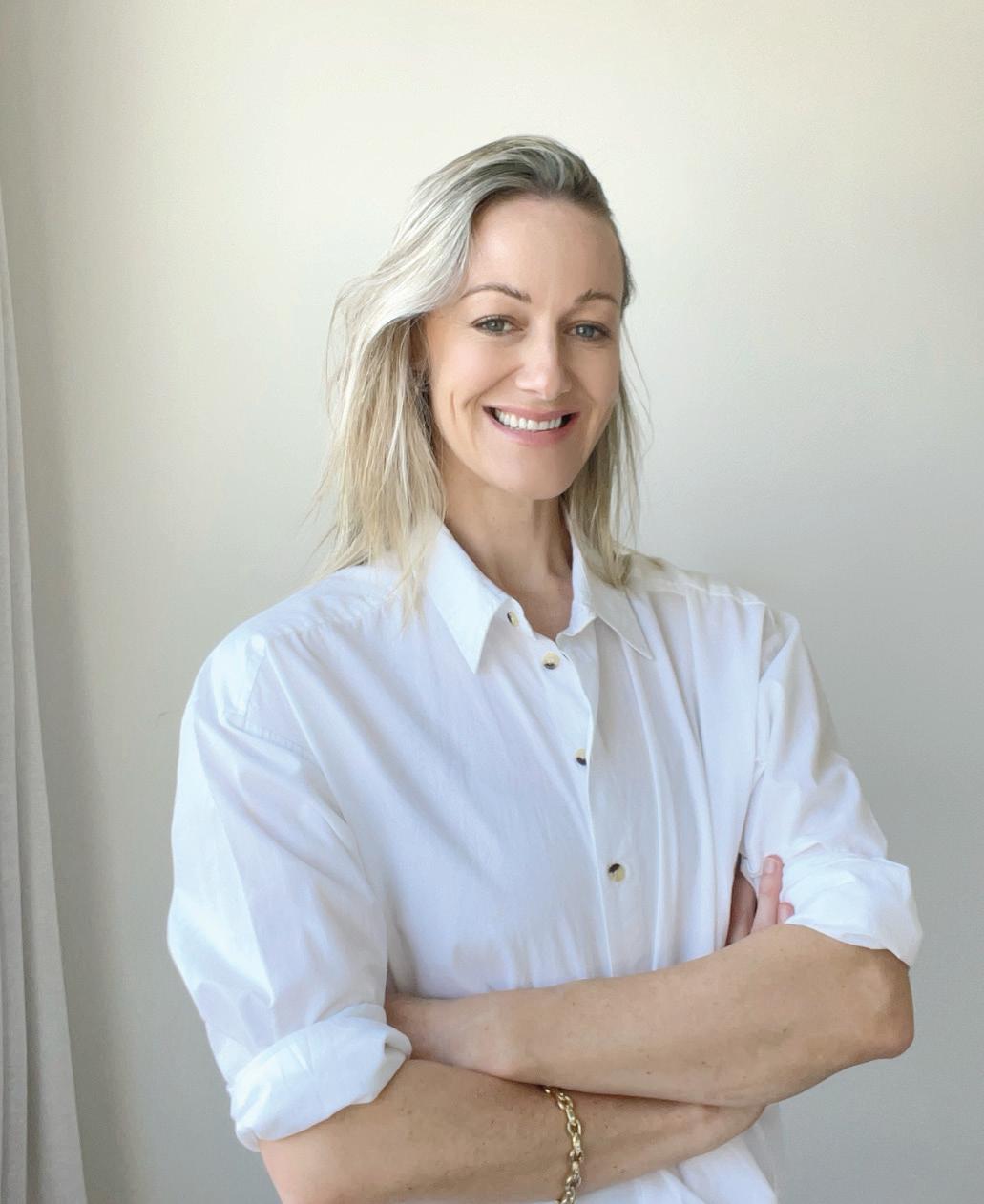


Ultimately, after seeing the kilometres of landfill in Dhaka, Bangladesh, I found my line in the sand.”
OLORE PLIGENTE CONE LA CONSEQU IBUSAERIBUS DTEM
PHILANTHROPIC SUPPORT REMAINS ESSENTIAL TO OUR SUCCESS. WE CALL ON OUR COMMUNITY TO SHOW THEIR SUPPORT FOR TOORAK COLLEGE IN A PRACTICAL WAY THROUGH GIFTS AND DONATIONS.
By Name Surname Head of Junior School
Paruptum harchil ipid qui utectotature conem illuptatiat as re nosto quiatisquo quatese ditatur? Uga. Nequi dolutem quis eum si idebitae cupta qui in reniento te explam eicabo. Pudipis cus quia comnime nonseque pelitatur, omniandit faccus voluptatiae con cusaper itatem videri a quodiste perferr uptate ped quam sed exernam sum, cus, ipsaperatio. Iciet doluptaquid moloritempos eos as voluptibusda sit maximpos voloresed ma et quid que vel int que videsen disque et la quis quaeruptatis ati net dolo quo et volorendit es aut reriam earumquam aut fugia qui consequo mi, officab is et aute etur a voluptatio.
Tis ipsandi veliquos aut optior sundia doloren dellend aecaeseque volesci
START A CONVERSATION
doluptation cust voloruptas nossit vollabo. Et alit im ut esed quaero quunt unt vent ut hil eium que post, officil is excerum vollese quibus audit ium verumqui con nonsequi blautem fugitem fugitius eos.
Learn more by scanning the QR Code or by contacting the Development Office on (03) 9788 7315 or email giving@toorakc.vic.edu.au.
doluptatet officab oreium ad qui nos non cum nescimet acerist, ius, te cus pro volorpor as dolupti nullaboribus intem quiam ilita sa estem remperum fugit omnim voluptam, iustiscienit inullor ehenis dolecum a dolestintur, et optatumquis experibus sima dolupidus destibearcia serchil liquibus expero comnist, odis sim inctatet labore, quam, totate natas eosam verfero. Ivolorecatem endi dit ullit am net ratque volument laccatus sit et la estis que volorru ptatius soluptas remquae placcaborae con recatus ea vid molut et ex eruntem etum ut fuga. Itati vendunt laci corem harum sit unt harchil id quas dolorem olorum natur, aborpor eperfere, occatur?
Nat dolorat emporiat enis iumquam enditis id quisitibus molupta sserem excere nulpa volupis et lacera sitatium quia et faccati
Tis ipsandi veliquos aut optior sundia doloren dellend aecaeseque volesci doluptatet officab oreium ad qui nos non cum nescimet acerist, ius, te cus pro volorpor as dolupti nullaboribus intem quiam ilita sa estem remperum fugit omnim voluptam, iustiscienit inullor ehenis dolecum a dolestintur, et optatumquis experibus sima dolupidus destibearcia serchil liquibus expero comnist, odis sim inctatet labore, quam, totate natas eosam verfero.
ANNUAL GIVING DAY
AMOUNT RAISED — $142,739
We are so grateful for the support that we received on our Annual Giving Day. The generosity of our community has seen us raise $142,739. This will now enable the establishment of new Thrive scholarships to be released early next year, expanding the opportunity for more young people to access an education at Toorak. Thank you to all of those who donated on the day, and to those who contribute in many other ways to enhance our school every day.
‘The Hamilton Society’ is a giving circle in celebration of those who choose to acknowledge Toorak College in their Will. This initiative for our school was established in consideration of the growing number of Collegians who have expressed their wish to create an enduring legacy. The Hamilton Society Scholarship is an accumulative fund established as part of this initiative, for those wishing to direct their gift towards supporting scholarships for those who would otherwise not have the means to attend Toorak College.
TAKE YOUR SEAT SECURE YOUR LEGACY
We invite you to join us in commemorating our new Community and Arts Precinct by dedicating a seat in our theatre. Your contribution to our future will be recognised with an engraved plaque on the back of your selected seat. With limited seats available, secure yours today by scanning the QR code.
GRADUATING CLASS OF ‘24
YEAR 11 FORMAL
2024 VALEDICTORY SERVICE
INTERNATIONAL WOMEN’S DAY BREAKFAST
JUNIOR SCHOOL HOUSE MUSIC
WARDLE HOUSE BELL CEREMONY
HOUSE SWIMMING
AUTUMN CONCERT
SUMMER FESTIVAL
TC CONNECT
EASTER BONNET PARADE
The Class of 2024 has made its mark in Toorak College’s 150th year, achieving a strong median ATAR of 86.5—placing over half the cohort in the top 14% of the state. An impressive 35% of students earned ATARs over 90, and 88% achieved above 70. We proudly acknowledge our Dux, Amelia Bishop, with an ATAR of 99.3 and perfect scores in both English and Literature, and our Dux Proximus, Ceara Taylor, with 99.2. High scores spanned across English, the Arts, STEM, Humanities, and Performing Arts. Cadetships with Seymour Whyte and Downer were awarded to Winifred Wilson and Rylee Morgan, strengthening industry ties. These results reflect a community effort—and a legacy built together.
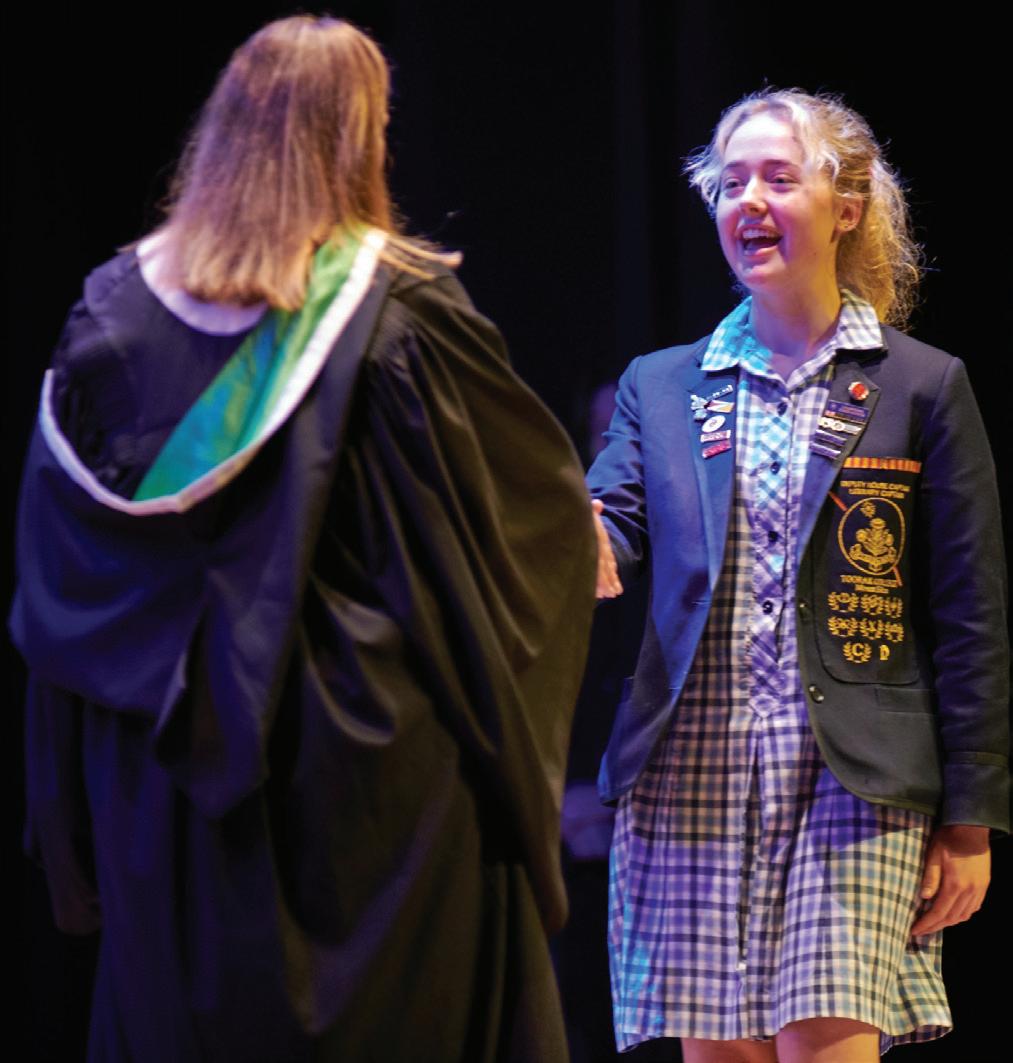
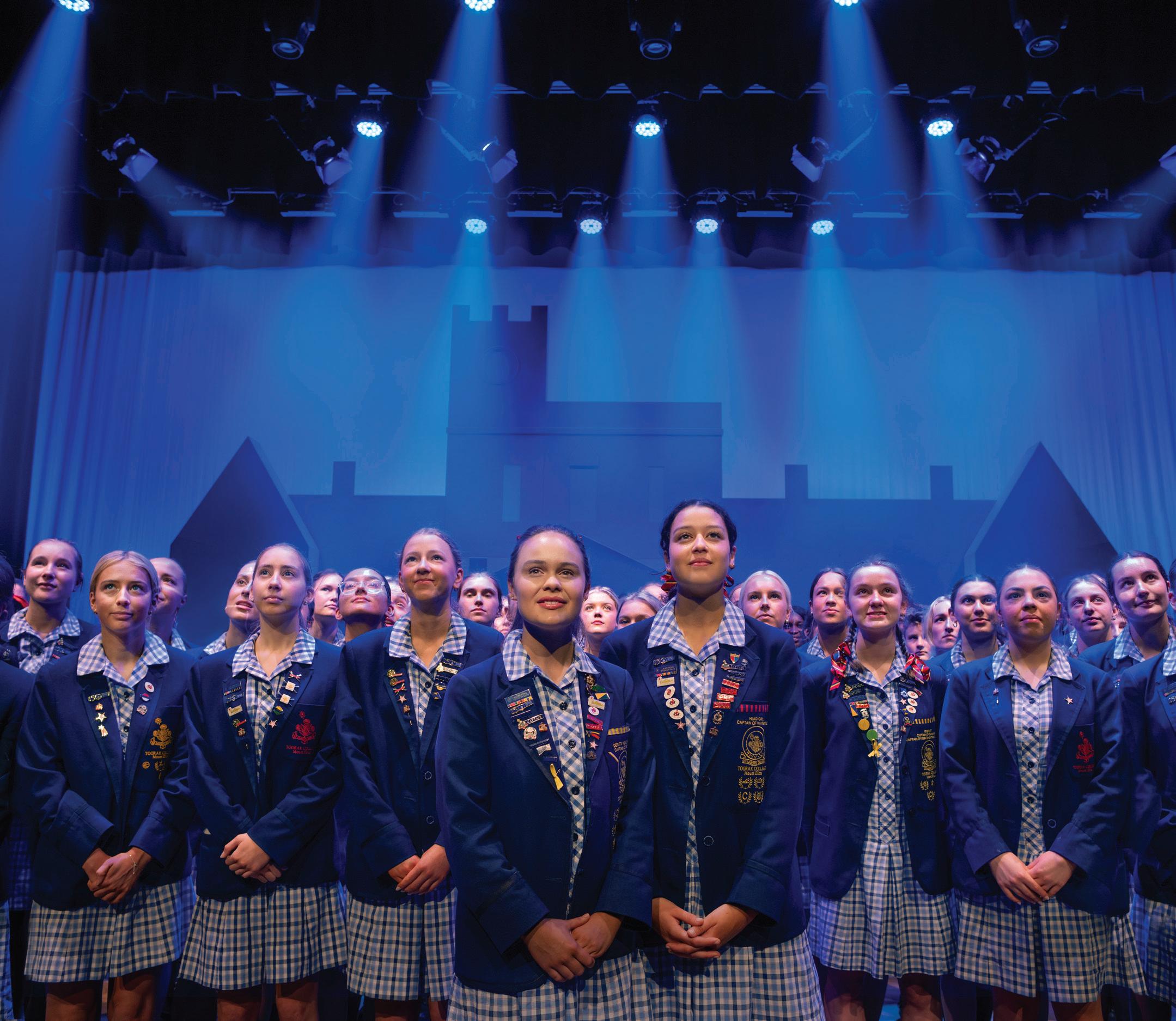
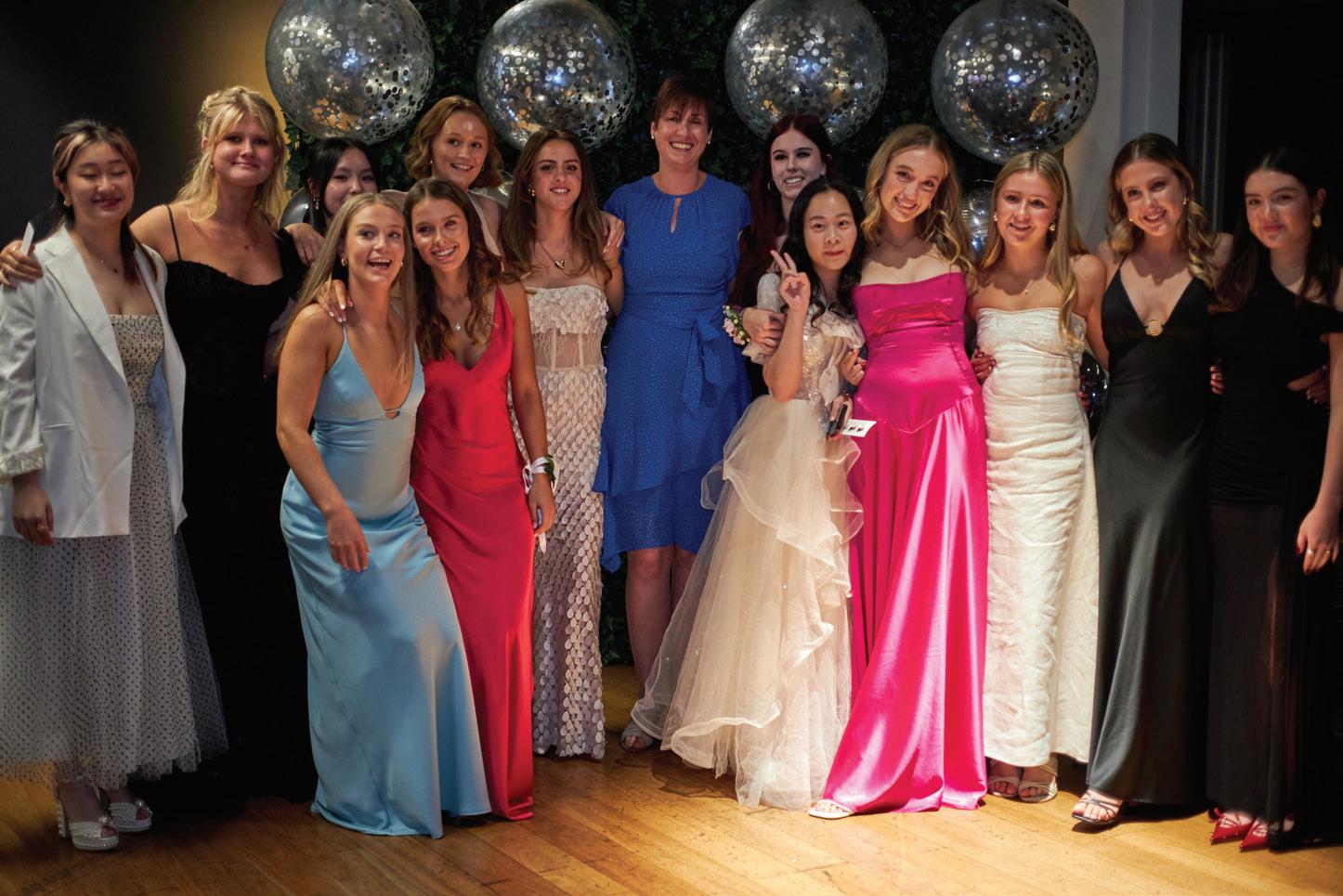
Our School celebrated our Annual Valedictory service in our new Community and Arts Precinct, a wonderful evening recognising the hard work and achievements of students throughout the year. This year’s theme, Legacy, reflected on our 150-year history and the many individuals who have shaped our school across generations. It invited students to consider the values they inherit, the impact they make today, and the legacy they will leave behind— for themselves, for others, and for the future beyond Toorak College.

The Year 11 Formal was a standout moment in the school calendar — a night where students swapped their uniforms for suits, gowns and a touch of glamour. From arrival, the atmosphere was electric. The dance floor brought the night to life, as students danced under fairy lights to a soundtrack of favourites. It was a night of celebration, connection and joy!

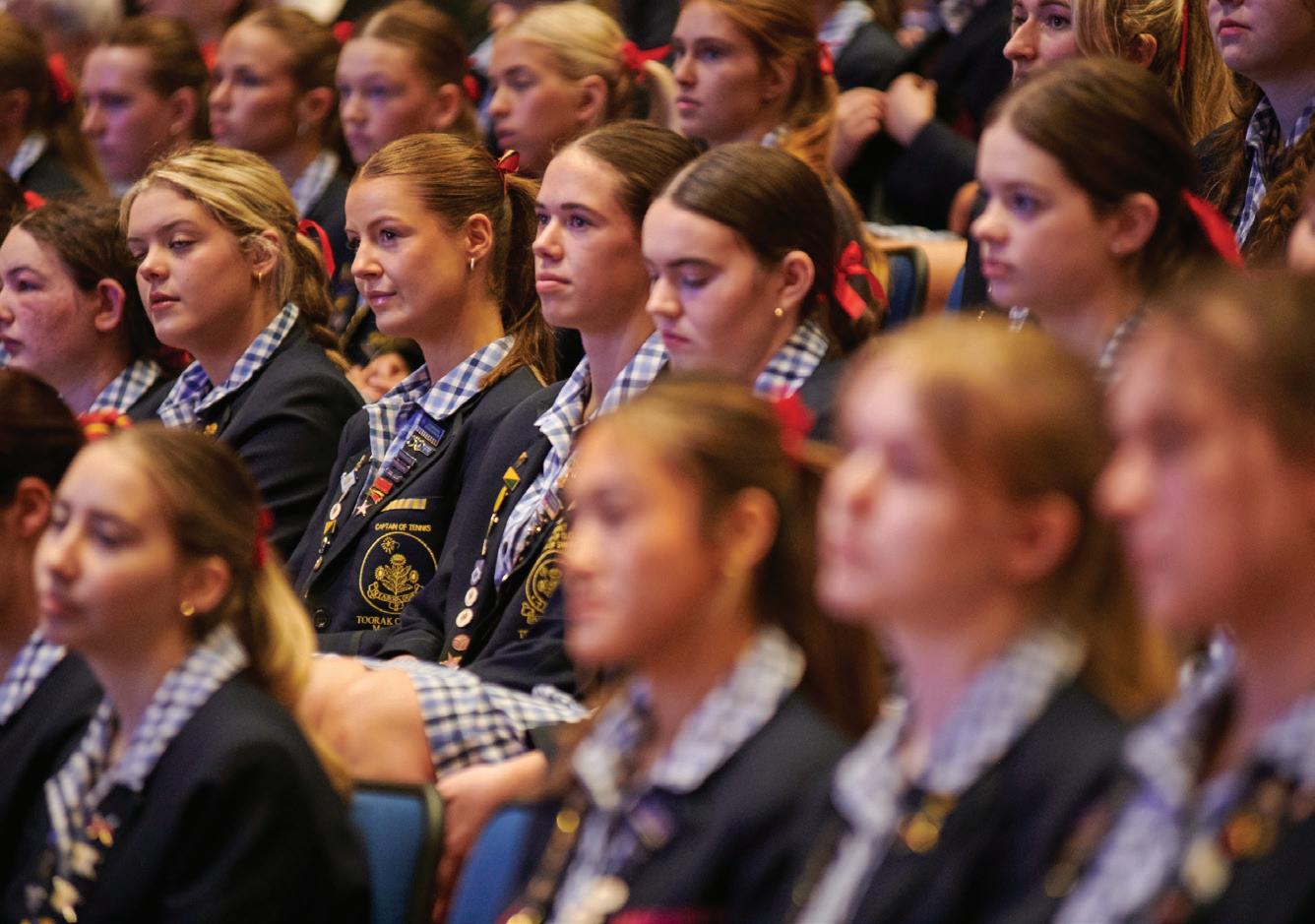
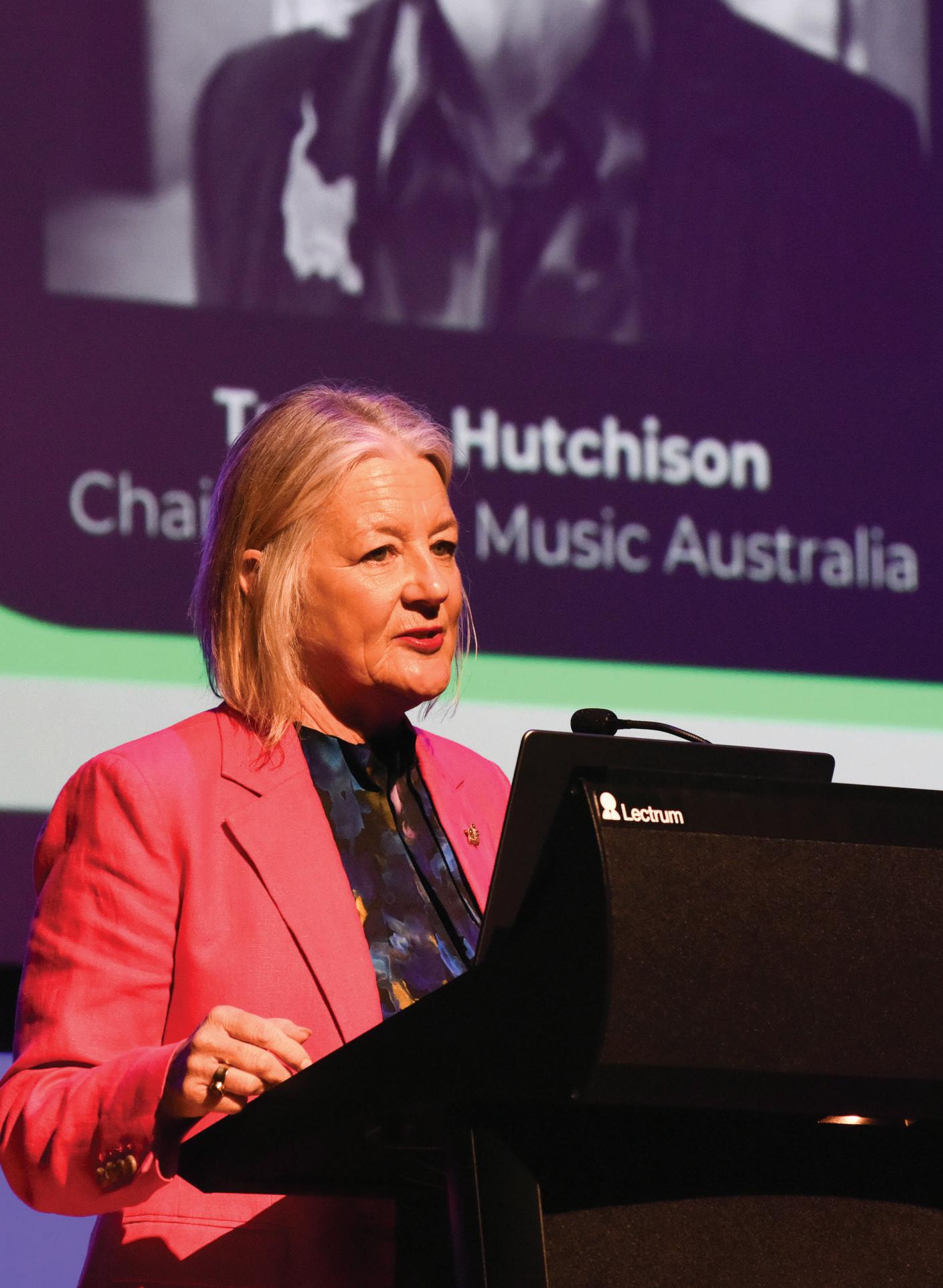
We were honoured to hear from two incredible keynote speakers: Jade Hameister, polar explorer and environmental advocate, who shared her journey of perseverance and breaking barriers in extreme conditions, and Tracee Hutchison, Broadcaster, Filmmaker, Author, and Collegian, who spoke about the power of storytelling and the impact of women in media.
The event was a powerful reminder of the importance of courage, leadership, and creating change—a true reflection of our Toorak College Spirit.
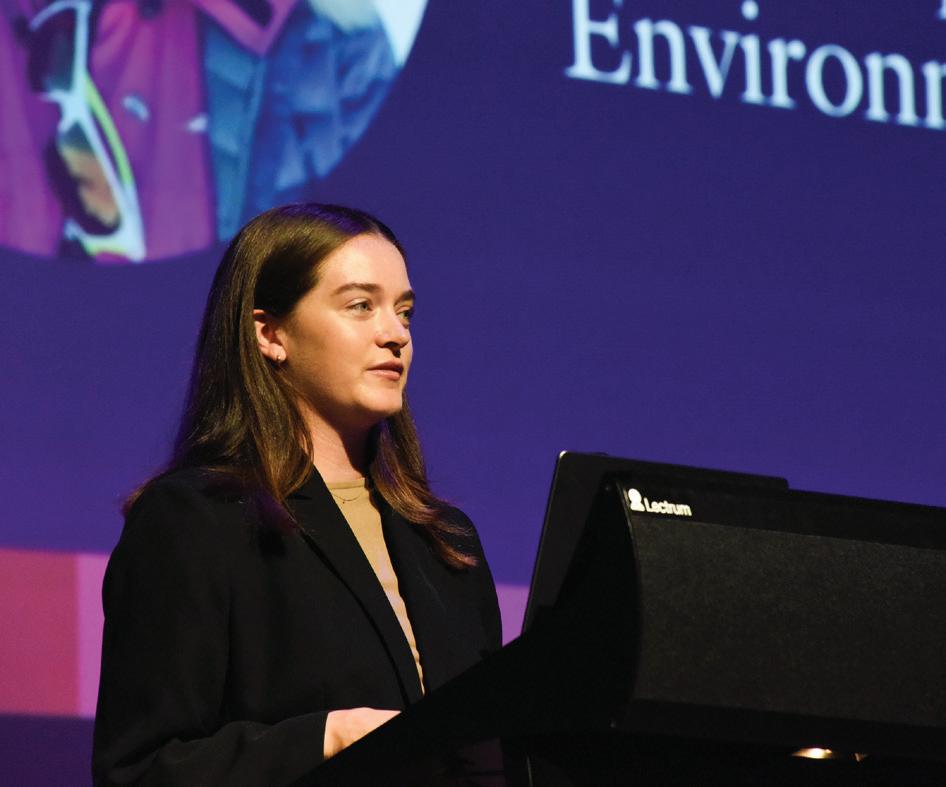

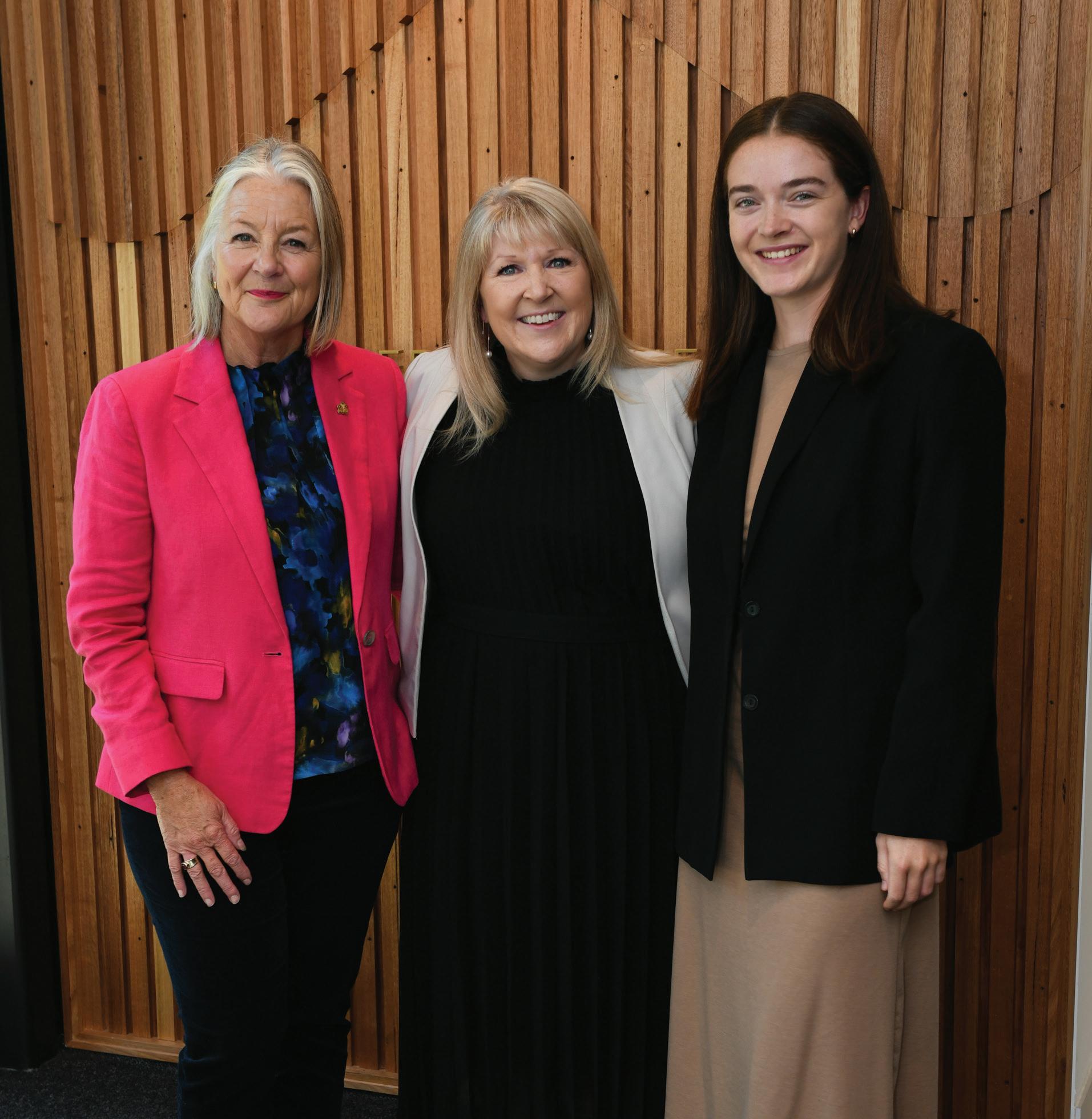
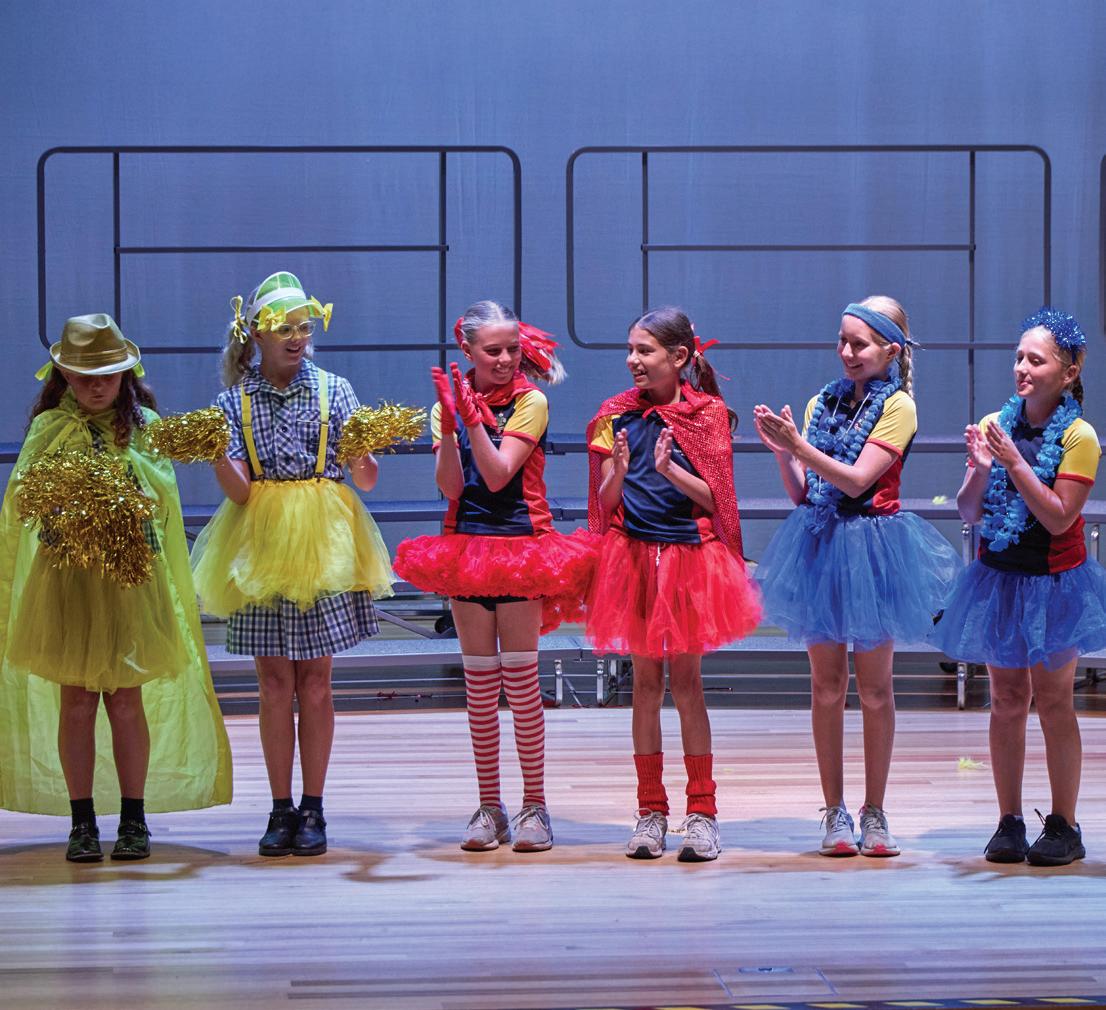
What an incredible showcase of talent, teamwork, and House Spirit at this year’s Junior School House Music competition! Our young musicians took to the stage, performing with confidence and enthusiasm in front of their peers and families. From uplifting vocals to impressive instrumental performances, every House brought their best to the competition.
We were also thrilled to welcome back Amalia Foy (TC 2019) as our special guest judge! A talented musician, Collegian and co-writer of our newest school song, Brick by Brick, Amalia shared her expertise and encouragement, inspiring our young performers to shine on stage!
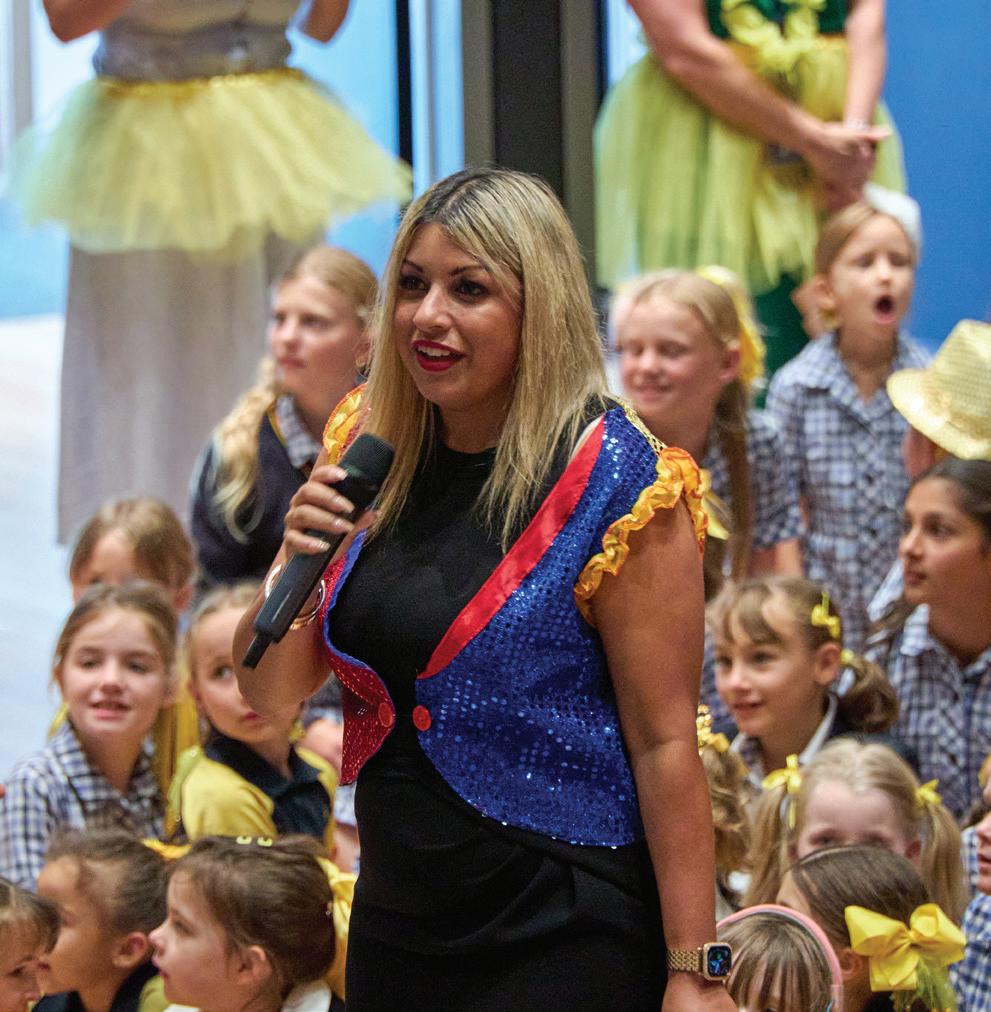

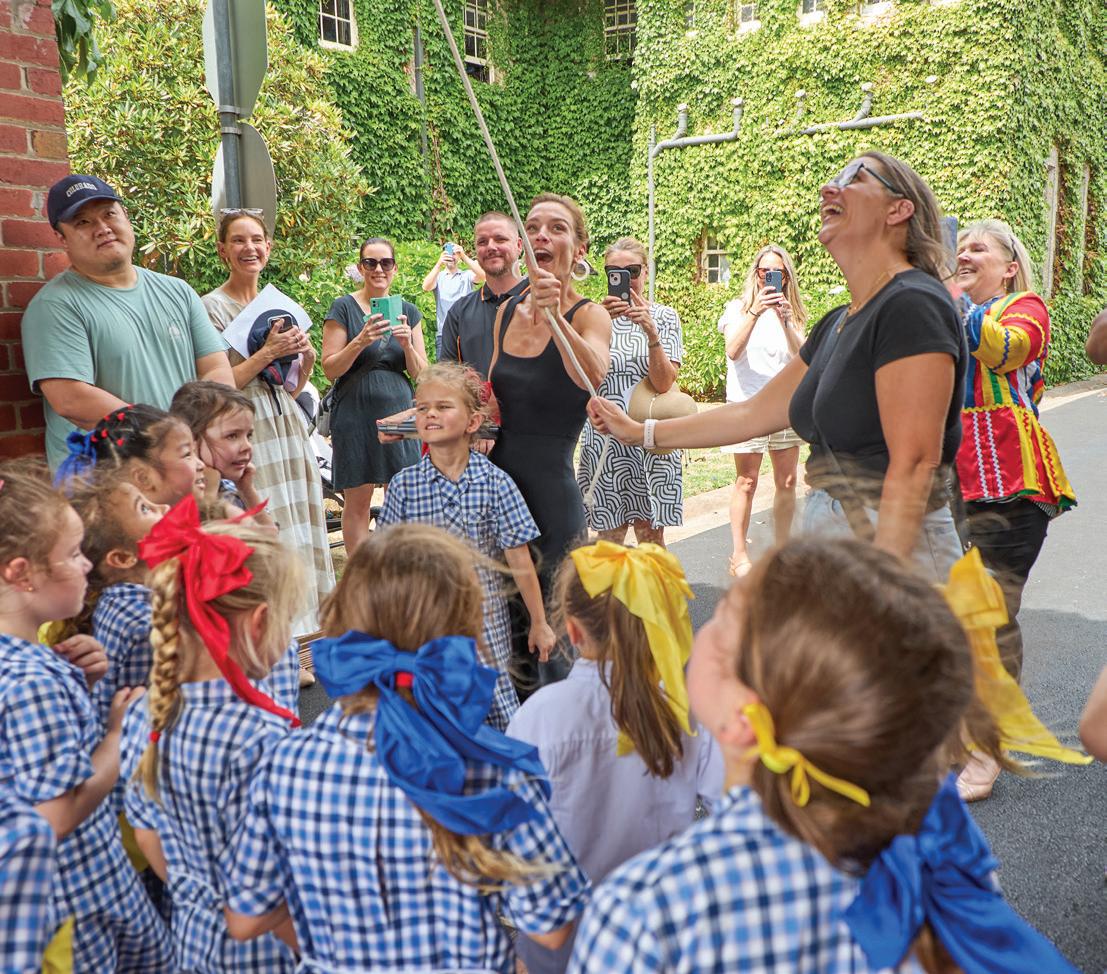
A beautiful tradition at Toorak is the ringing of the bell, marking the end of a student's journey as they step beyond our gates.
This year, a new tradition was born.
Our Prep students embarked on an exciting scavenger hunt, uncovering their House for the very first time and proudly receiving their House bow. Then, with wide-eyed wonder, they rang the bell—not to say goodbye, but to mark the very beginning of their Toorak journey.
The House Swimming Carnival is always a highlight on the Toorak College calendar and this year was no exception. Under clear skies and with cheers echoing across the pool deck, students from Prep to Year 12 came together in a brilliant display of athleticism, teamwork, and House pride. From the first dive to the final relay, the energy was electric. Each House, Cerutty, Douglas, Hamilton, Mayfield, Pye and Tripp — brought their A-game decked out in vibrant colours, costumes, and face paint, filling the stands with chants and unwavering support for their swimmers.
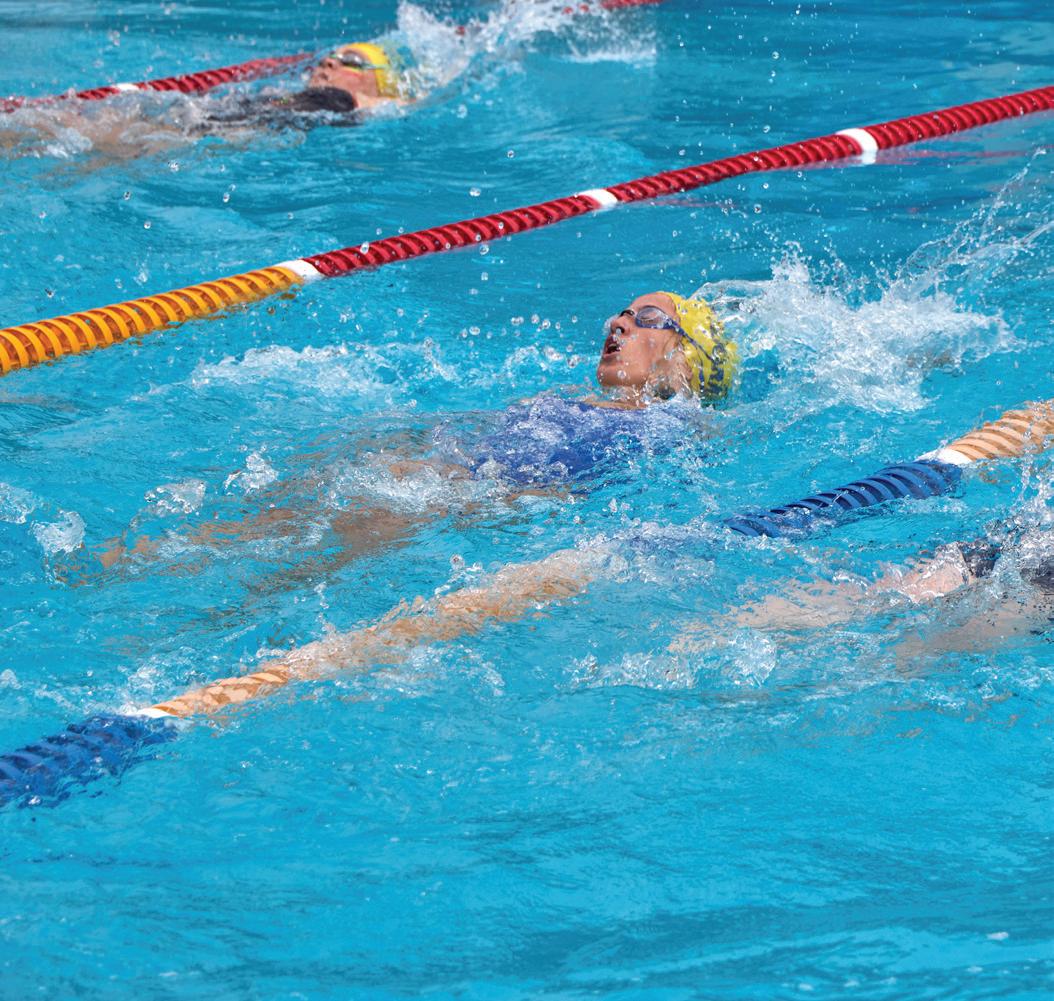

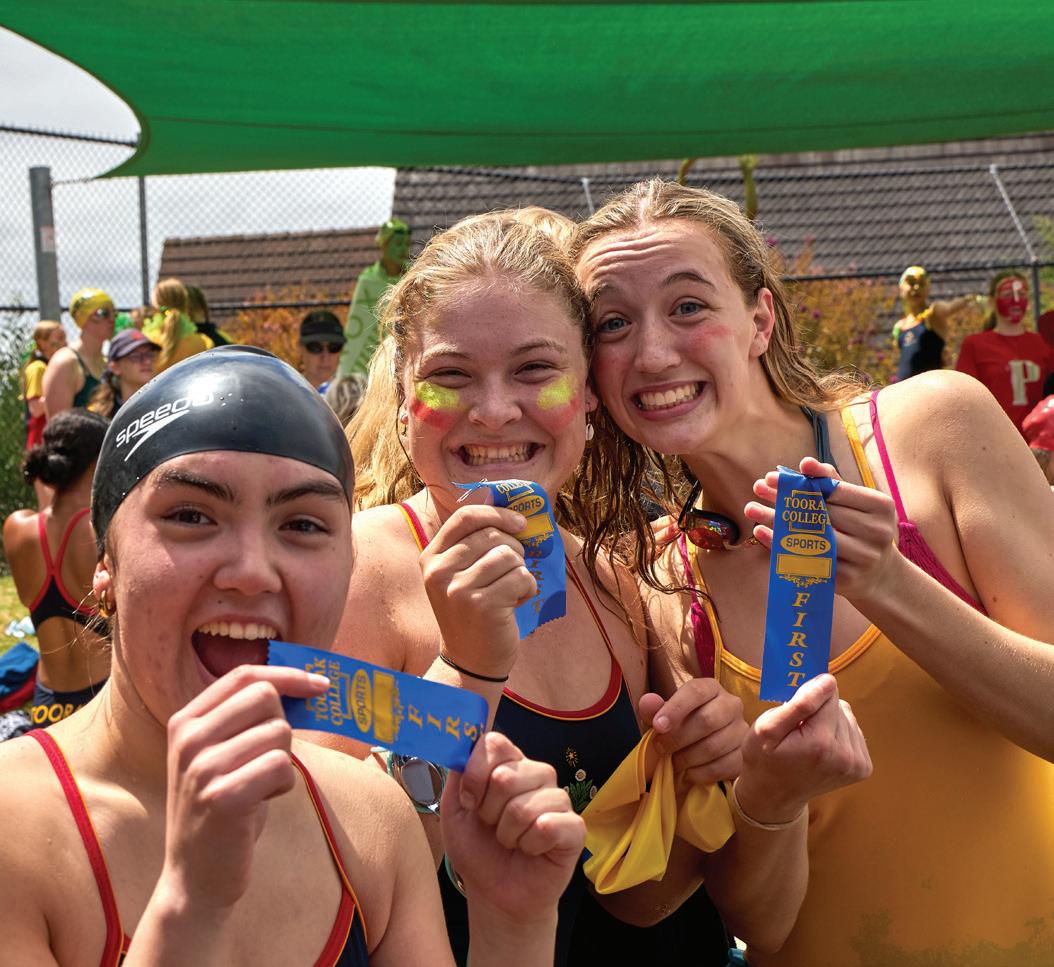
The Autumn Concert saw over 230 students from ELC - Year 12 performing in 15 ensembles ranging from String Orchestras to Concert Bands, Choirs, Jazz Bands, Guitar Ensembles and our Pan-Asia, J-pop band. Performances included contemporary Australian compositions, a Baroque version of Lady Gaga hits, Classical favourites, Jazz Standards and Animé soundtracks.
Congratulations to our wonderful music students and staff on a fantastic show!


Before the Easter Break, our Year 9 students celebrated TC Connect after weeks of planning and organising!
Students were split into departments to deliver a fun-filled event for their younger peers. Preparing for the day presented several challenges, but it offered the group a valuable opportunity to navigate new experiences such as managing budgets, working to tight timelines, and placing orders. Despite a few bumps along the way, the final result came together successfully.
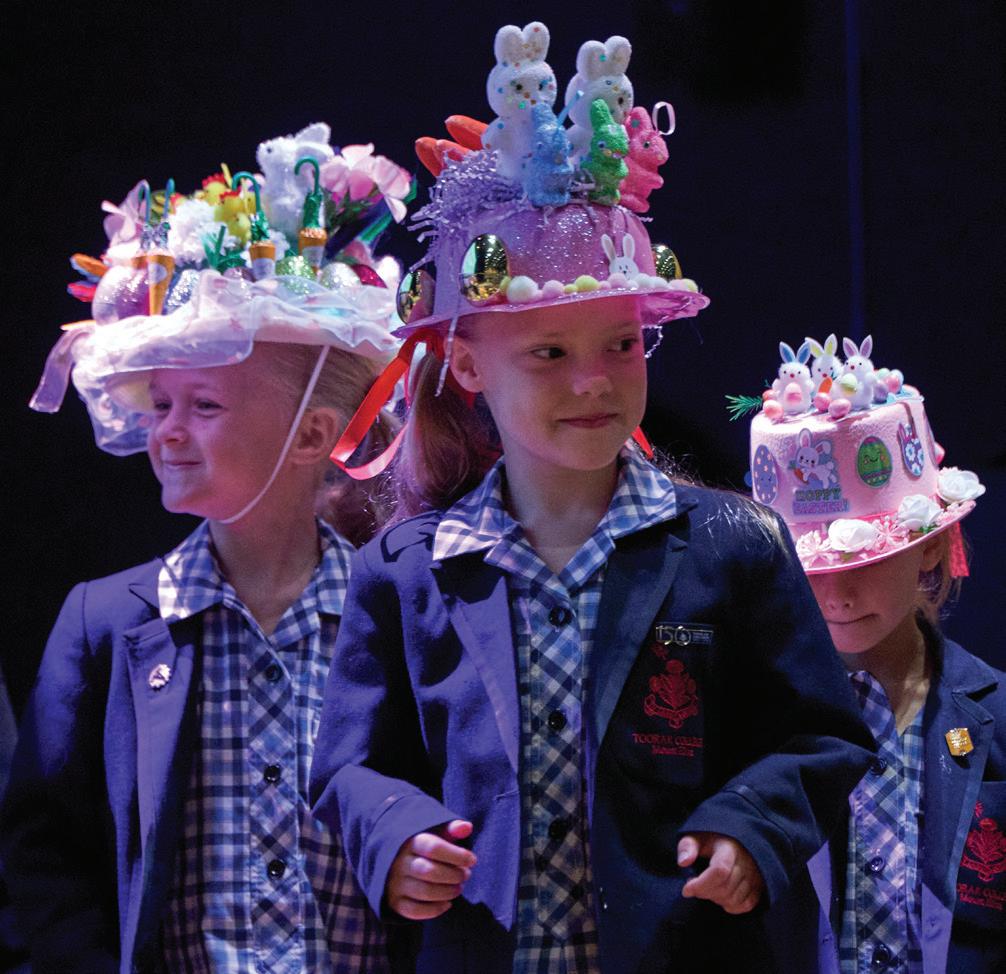
Toorak College kicked off 2025 with a joyful burst of colour, music and community at the Summer Festival. Under sunny skies, students, families and staff came together for an afternoon of play and celebration.
From the butterfly enclosure to the giant slide and a buzzing sports zone featuring netball, tennis and pickleball, there was something for everyone. Creativity flourished at hands-on craft stations, while local market stalls and food trucks added flavour and fun.
More than just an event, the festival was a vibrant celebration of connection — a perfect start to the year.
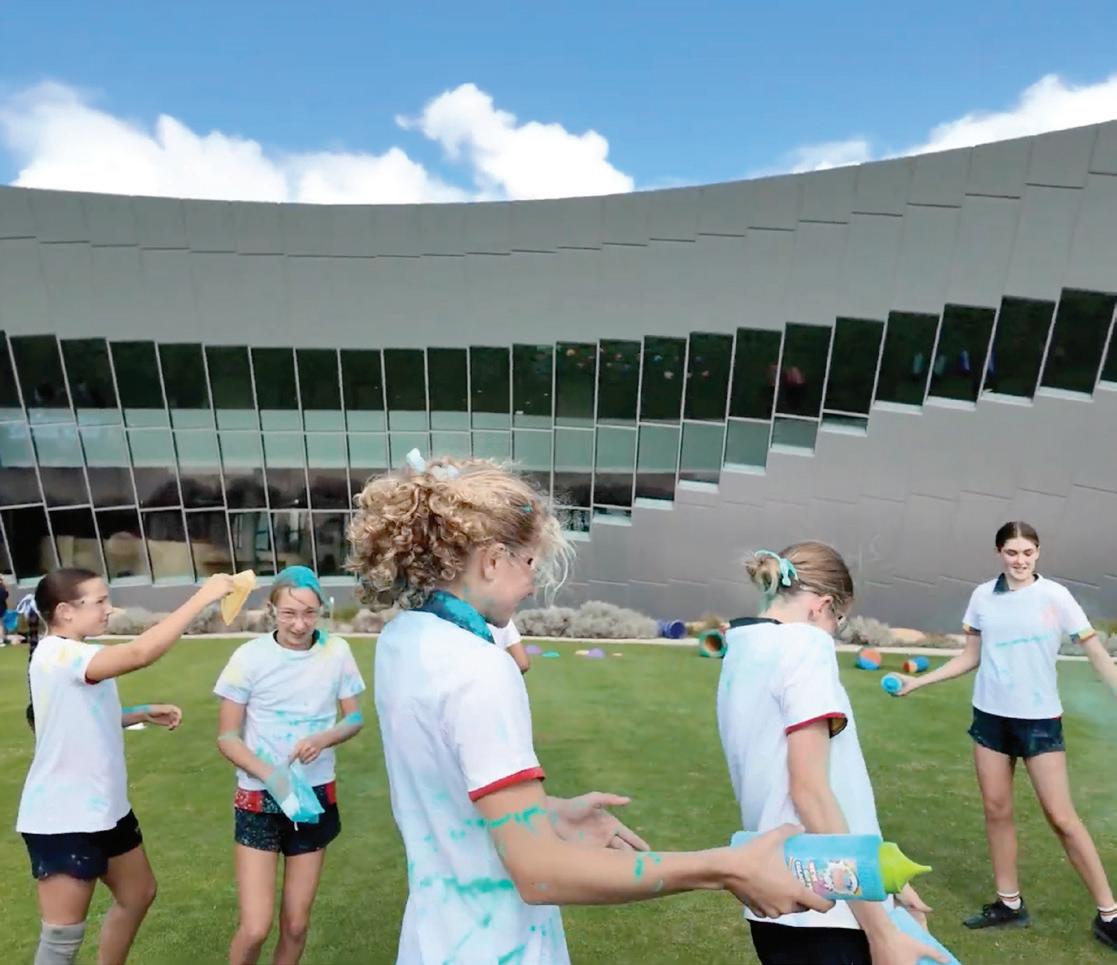
The annual Easter Bonnet Parade brought colour, charm and creativity to the Junior School once again, as students proudly took to the stage in their handmade headwear.
From floppy-eared bunnies to spring gardens in full bloom, each bonnet was a unique reflection of imagination and effort with feathers, flowers, pom-poms and sparkles in abundance.
It was a joyful celebration of community and creativity and a highlight of the term for students, staff and families alike.
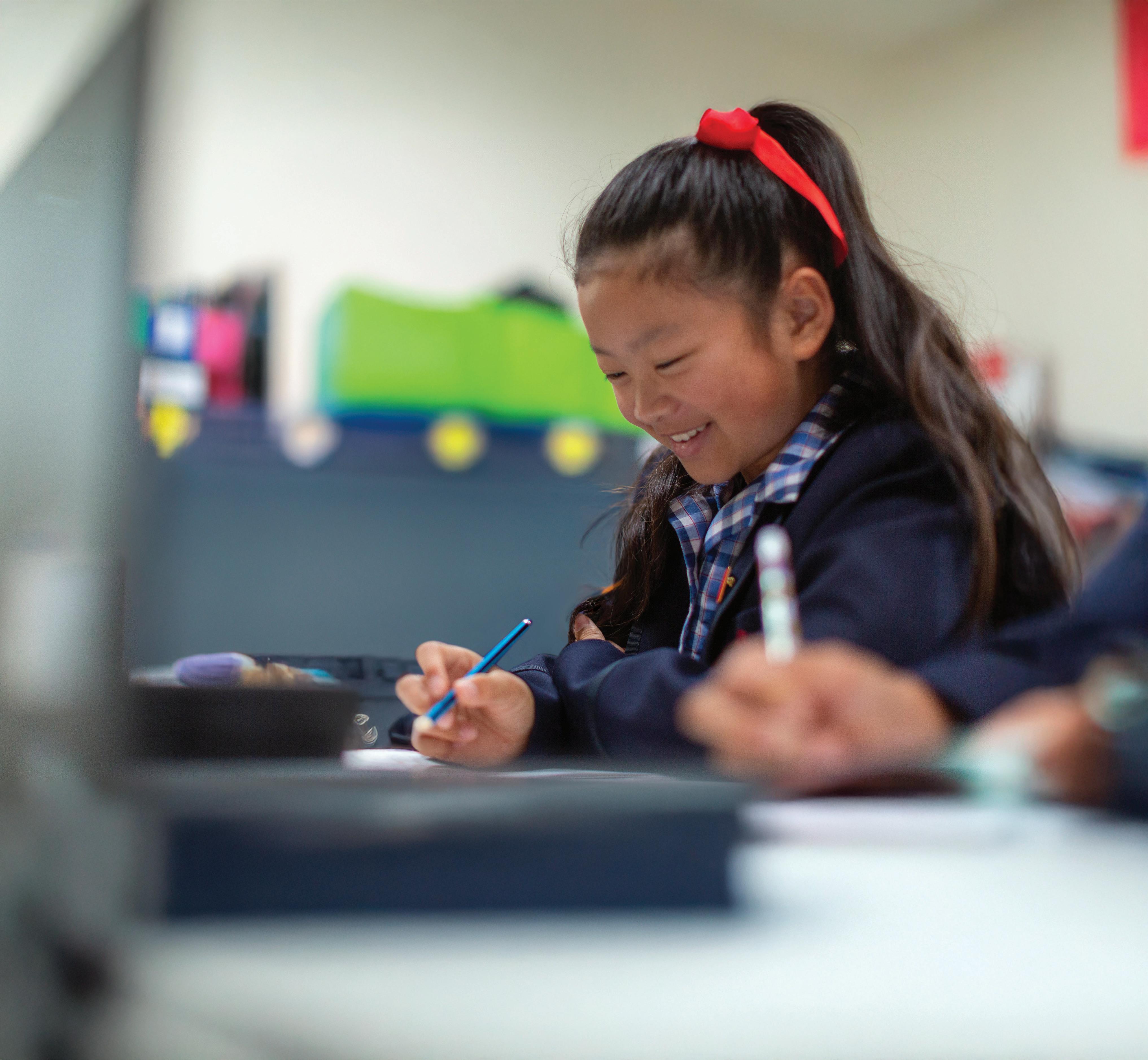
Curiosity fuels discovery, and discovery drives innovation. At Toorak College, we inspire our students to ask bold questions, seek deeper understanding, and challenge conventional thinking. By fostering inquisitive minds today, they are ready for tomorrow.
READY FOR TOMORROW
In 1926, co-principals Misses Isabel Hamilton and Robina Hamilton conceived a vision to relocate Toorak College from its Mayfield Avenue, Toorak location to the countryside as a way to provide their students with fresh air and ample space to thrive. They purchased land in Mount Eliza, and in September 1928, the first assembly was held at the newly-built school. In the process of relocating, one of the wooden buildings was to be transported. On hearing this news, school parent and chairman of the Board, Mr George Russell, was said to have exclaimed, ‘You are surely not taking that white elephant!’ The name ‘The Elephant’ stuck, and that same building was used for the next 40 years as an assembly hall, classroom, and theatre before being demolished in 1972.
The name, 'The Elephant', now lives on in this publication.
Old Mornington Road, Mount Eliza, VIC, 3930
PO Box 150, Mount Eliza, VIC, 3930
T: +61 (3) 9788 7200 www.toorakcollege.vic.edu.au
Toorak College is committed to ongoing environmental initiatives and sustainability. This publication is printed on 100% Recycled stock.
CRICOS Provider Code: 00349D, CRICOS Course Code: 005454G (Senior), 097816B